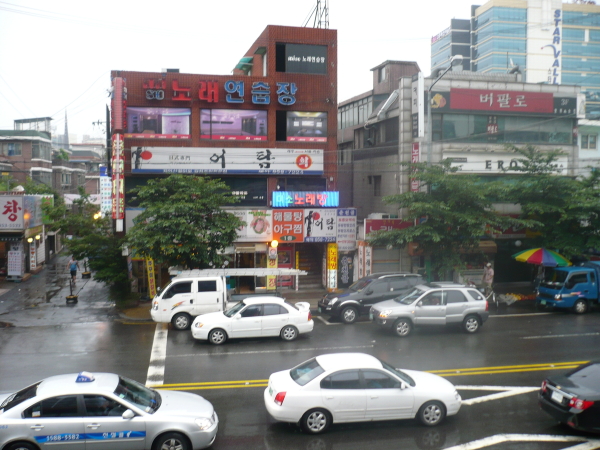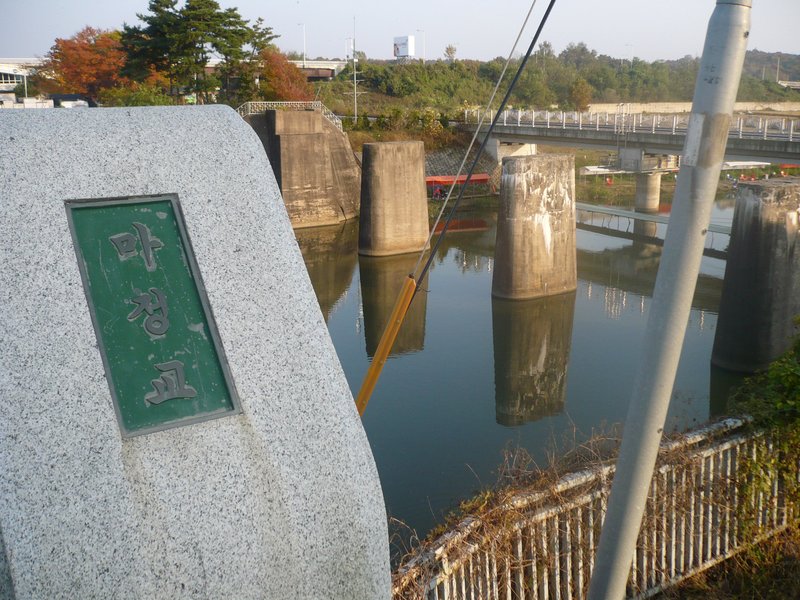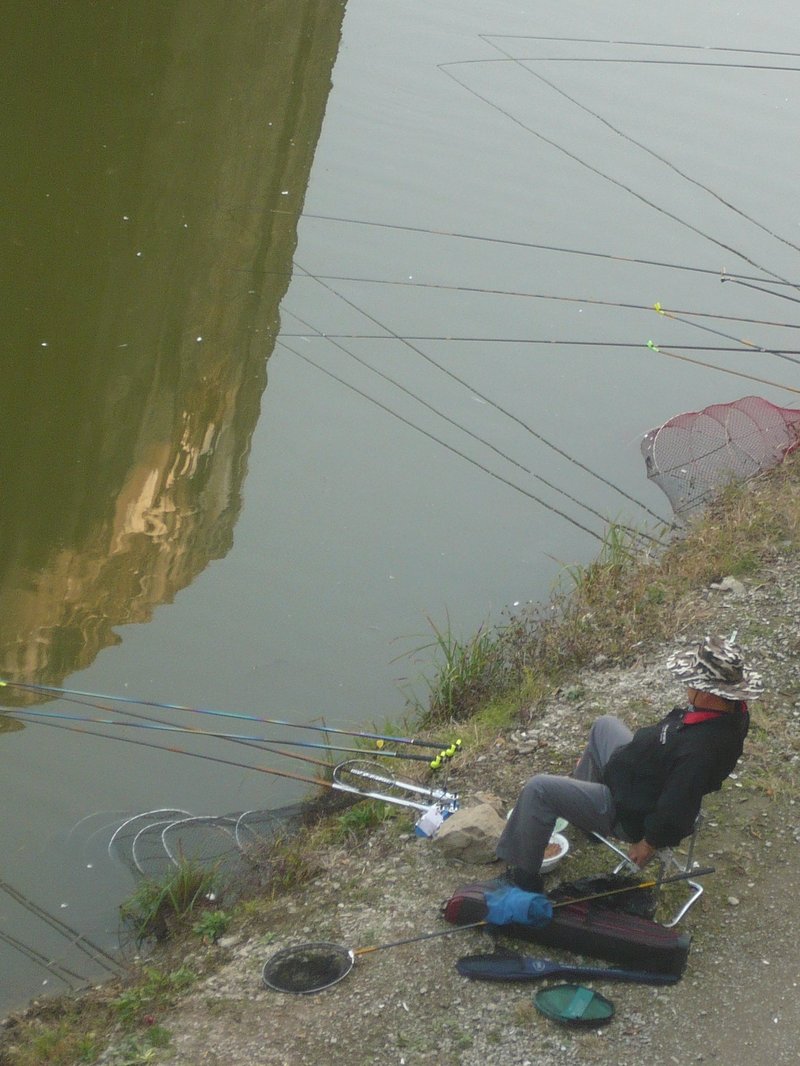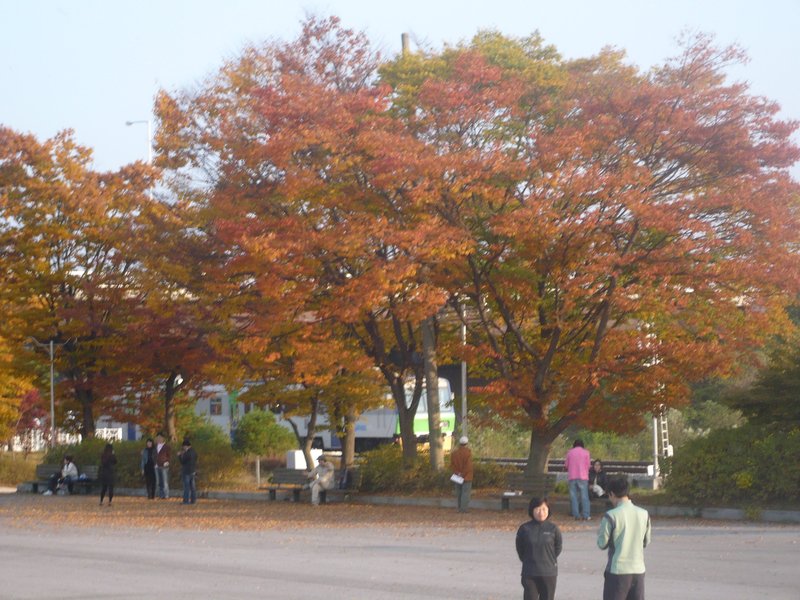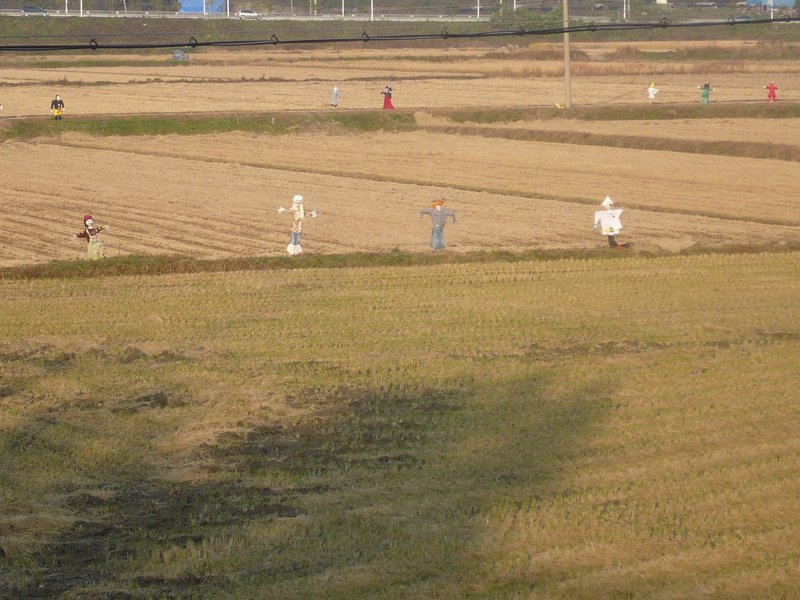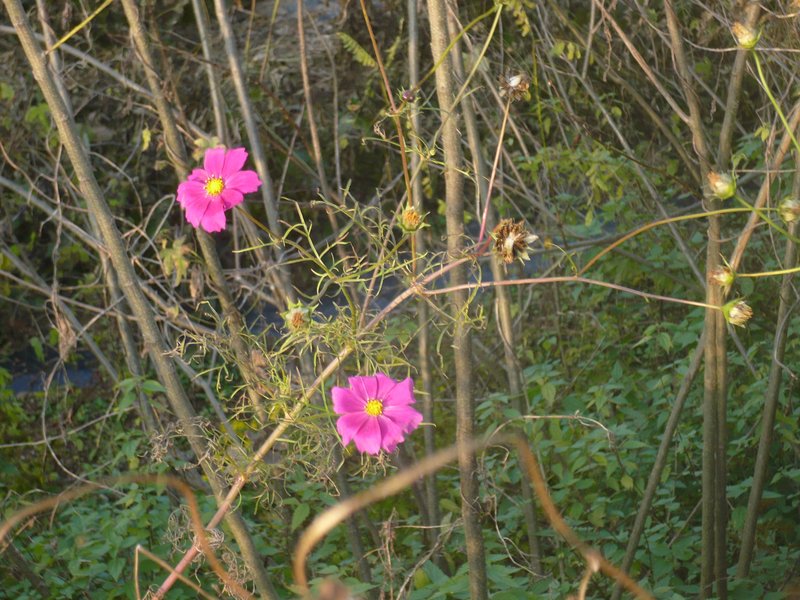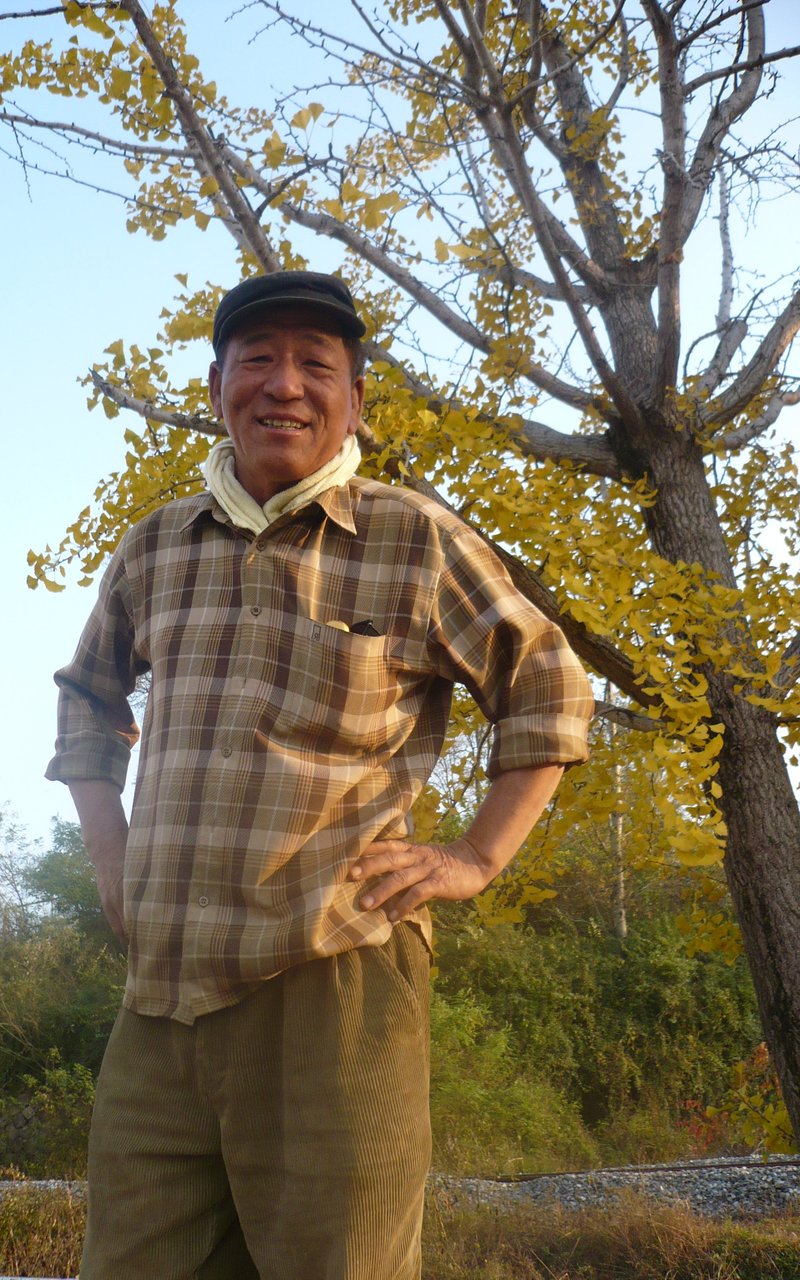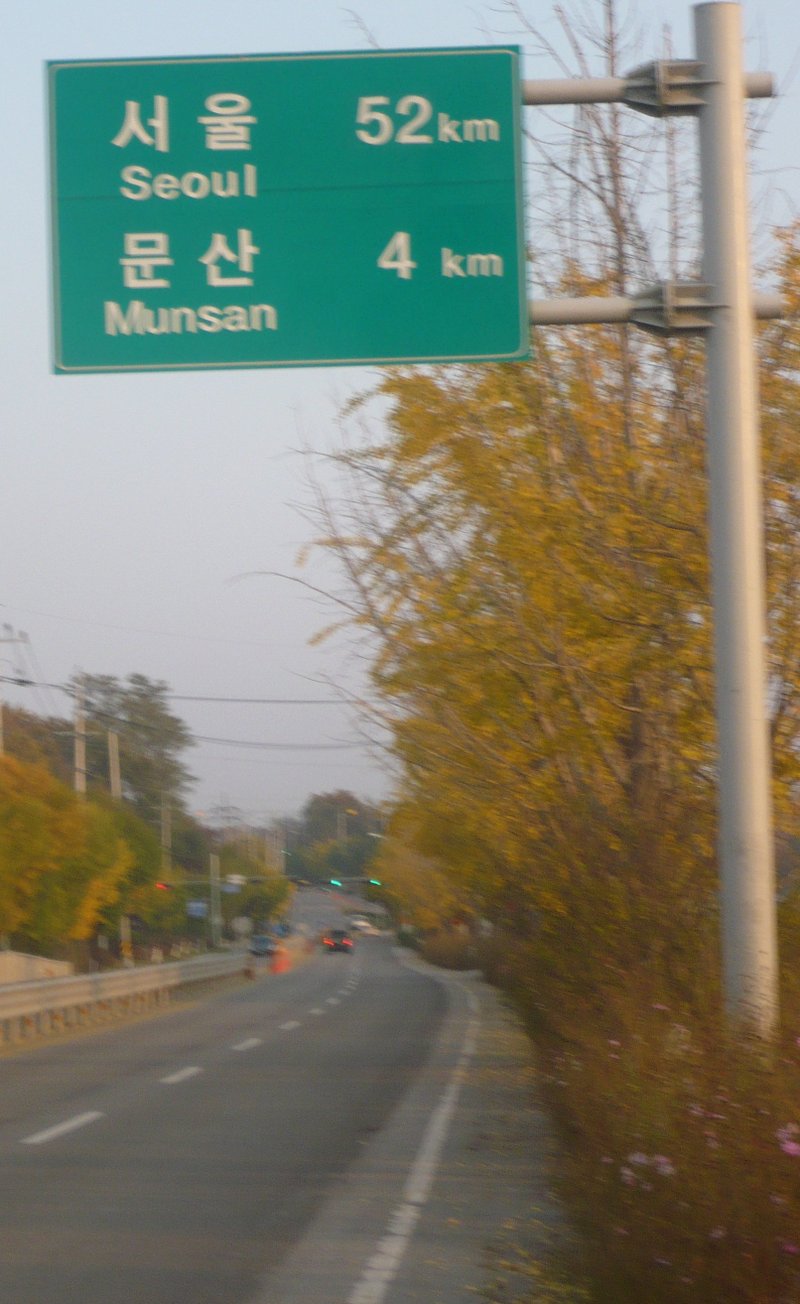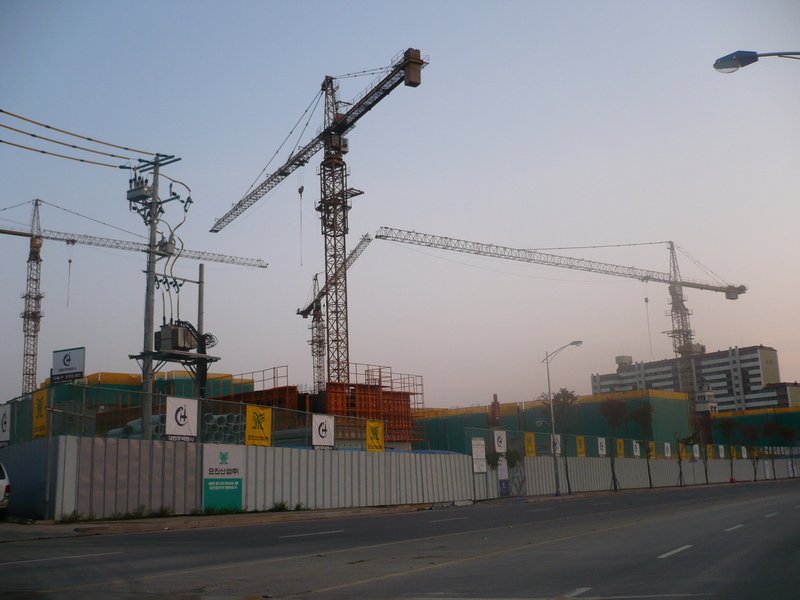Category: My Photos
Caveat: 과연 외로움은 상처보다 견디기 쉬운것일까?
Yesterday, with my extra day off, I met Basil in Gangnam and ate some delicious very authentic-tasting tacos al pastor – they could’ve come from a street vendor in Mexico City. I felt happy.
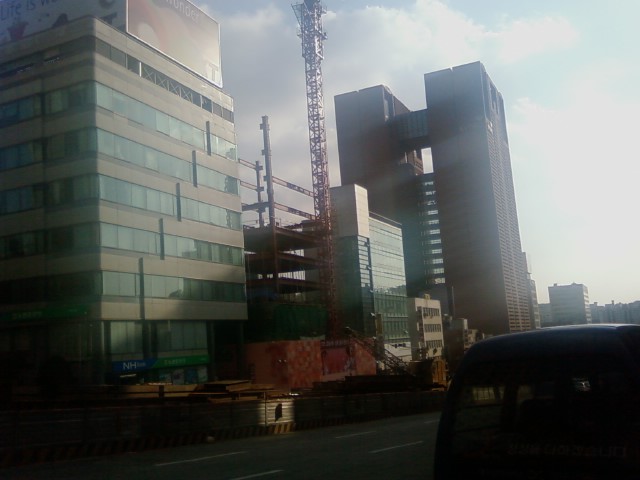
Today was more melancholy. Time is running out on my never-ending vacilation/procrastination regarding my decision to stay with ElBeuRitJi or not. I hate the fact of having to make decisions like this. If you just read my blog entries, you will conclude that I’m not very fond of ElBeuRitJi. And that’s true. But there are factors that encourage me, nevertheless, to want to renew. The primary one being that I’m craving some stability and/or predictability at the moment, and I am finally feeling somewhat pleased with the progress I’m making on my efforts to learn some Korean, so to throw things up in the air to see where the land, just now, feels like “running away without a good reason.”
Anyway, nobody will want to read too much about my angst. Let’s just say, by the end of the week, I’ll know for sure if I will be staying with ElBeuRitJi for another year or if everything will be up in the air come end-of-August, with who-knows-what coming next.
In other news… “Go-Stop” is a ubiquitous card game Koreans seem obsessed with–scenes involving people playing this game appear everywhere in movies and dramas on television. I am trying to learn more about it. Rules: https://www.pagat.com/fishing/gostop.html
-Notes for Korean-
context: random notes
매일=everyday, daily
메일=email
날=day
괴물=monster
어린이=child
싫어=”Nope” or “I won’t do it” (a bit rude I think)<=싫다=to be disagreeable, to be unwilling, to be unpleasant
-보다=[comparative particle ending] “…than…”
-네=”and family” after a name, e.g. 달자네=Dalja and family
context: reading a transcript alongside a tv drama
과연 외로움은 상처보다 견디기 쉬운것일까?
=indeed loneliness-TOPIC injury-than bear-GERUND easy-thing-COPULA-CONJECTURE
=”can it be that loneliness is easier to bear than pain?”
context: a web advertisement for a game
재미없으면 보상해드립니다!=”if you are not amused, you get a refund!”
I’ve decided to add this to my blog’s tagline, for a while. The breakdown:
보상=reward, compensation, recompense, refund(?)
드리다=[DONATORY auxiliary verb, HONORIFIC BENEFICIARY]=give, let, set, make a present of something to someone… preceded by V+어/아/여
cf. 주다=[DONATORY auxiliary verb, HUMILIFIC BENEFICIARY]… also preceded by V+어/아/여, which we use all the time to make requests…
… these are a case of a HONORIFIC/HUMILIFIC lexical pair, I think.
Just below, in the ad:
그걸과!=…I have no clue what this means, exactly; 그거-(<=그것) can be “that, this,” but what’s that embedded -ㄹ-? an OBJ ending? 과=and, with, against; but that means the phrase has no verb… is that OK? it would mean something like “against that!” doesn’t sound quite right…
context: reading the labels of household products
곰팡이=mold, mildew
![]()
Caveat: 빌코멘 오바마
I was riding the subway, and looking at a newspaper over a man’s shoulder. There was a big headline, that read “빌코멘 오바마” (bil-ko-men o-ba-ma). And there was a picture above the headline, that definitely gave away the second word – it was a certain popular American politician. The first word took a few more seconds to puzzle out. But I’ll give a clue – that certain American politician was giving a speech in Germany. So, I’ll let you polyglots out there decipher what that first word is – it’s not Korean.
I decided to do some random exploring. I got off the subway at 독립문 (Dongnimmun). I wandered around the neighborhood, with a vague idea of trying to go up over the mountain to the southwest, toward Sinchon past the Geumhwa tunnel, but the moutain didn’t appear to have footpaths over it – at least not from where I went.
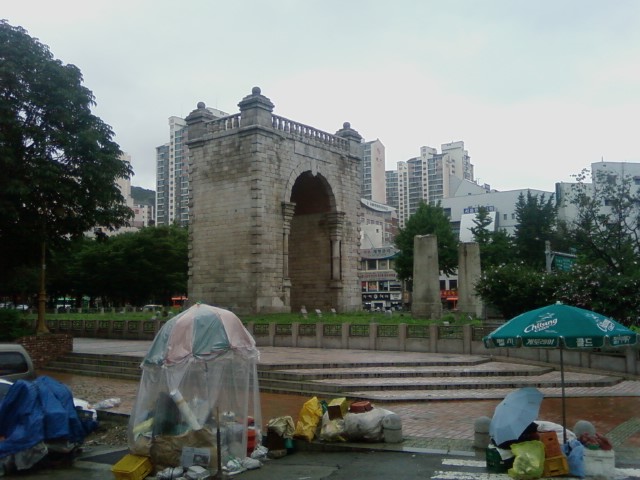
One odd thing I noticed was when I looked up at the Independence Gate (which is what 독립문=Dongnimmun means), and I saw written there, very clearly, 문립독=Munipdok… which is to say, the three hangeul glyphs are in reverse order! Why does the gate have its name written backwards, on it? I have two speculations. First, it’s because I was looking “out of” the gate – I was standing to the east of it, meaning closer to downtown, and the gate was on the western side of the old city, so, the side I was looking at was the “inside.” So maybe the name was written backwards to match up with what was written on the other side? The other speculation is that maybe it has to do with Chinese word order? I couldn’t find a solution to the mystery through any googlings. Anyway, I took a picture of the gate, but the backward hangeul at the top of the arch doesn’t show up very well – the resolution wasn’t good enough on my phone’s camera, I guess.
I got on a bus randomly, and it did in fact take me toward Sinchon. But in the meantime I’d lost interest in trying to get to Sinchon, and had become fixated on making my weekly visit to a major bookstore. So I got off the bus when I saw a station on the number 5 subway line, and rode it two stops to Gwanghwamun, where there’s a big Kyobo bookstore. Too big – I like the one in Gangnam better. This one was a freakin zoo, it was so crowded. Maybe it was because of the rain. I bought a few magazines and one book, and left much more quickly than I normally do.
I have spent some time messing around on naver.com, trying to become more comfortable and proficient navigating the internet in Korean. I found a great posting (in English) that someone did on the basics of how to use naver.com, Korea’s number one internet portal. In any event, I can now proudly say that I have a Korean email address – to go with all my other email addresses! It is jaredway [at] naver.com.
-Notes for Korean-
context: surfing naver.com
만들다=make, create, so… 만들기=[a button on a website, “create!”]
…and therefore, “하느님께서 태초에 천지를 만드셨다” “in the beginning, God created heaven and earth.”
On seeing this, I got curious about the Korean word for God. There are two words which have different origins but are (in)conveniently quite similar in pronunciation (which creates confusion and/or clarity depending on one’s attitude towards semantic ambiguity, right?):
하느님(haneunim)=god as a traditional “lord in heaven” and mentioned even in pre-Christian Korean literature, and, e.g., the Korean national anthem. It comes from 하늘(haneul)=heaven, sky… hence, “sky guy [honorific]”
하나님(hananim)=a capitalized, monotheistic God, “number one guy [honorific]”
…
성격=personality, type
열린=open, unlocked
닫힌=closed… from 닫히다=close, shut
숨은=hidden… from 숨다=hide
…
분류=classification
생활=livelihood, lifestyle
생활하다=live, subsist
-점(店)=a store;a shop
![]()
Caveat: “Notes for Korean”
Over the last month, I’ve been trying to get more serious and disciplined about my study of Korean. I have begun to keep little computerized notes, every single day, of interesting or useful vocabulary items, phrases, and things like that. But I’ve reached a point where I have compiled enough of these that they’re becoming difficult to keep organized; more importantly, I sometimes go looking for something I know that I put into a note, and cannot find it. Also, some of these things are things I would love to have found by searching online, in the same way that I have found other similar things.
Because of all of that, I have decided that it might be useful to post these daily notes and observations about Korean as a kind of footnote to each day’s blog entry. This will make them searchable by not just me but by anyone – although it won’t improve their level of organization. But with google, who needs organization? – just let the spiders crawl around and find it, right?
So, starting today, I will include a little, disorganized spattering of notes somewhere in each blog entry. Most of my regular readers (how many are there, really? 3? 2?) will not have much use for this, but they’re mostly going to be there just for myself, as it’s a convenient and logical place to put them – I’ll be able to access them anytime I need, and I’ll be able to search them, too. Further, by compiling them I’m helping myself to remember them, and I can express my joy at trying to make sense of this fascinating yet difficult language.
-Notes for Korean-
context: my cellphone’s “phrase of the day”: 식품 매장이 몇 층에 있는지 알려주실 수 있습니까?
매장 =department, floor (as in a dept store), store
so: 식품 매장=food floor, food court
and: 알리다=know, tell, inform, notify
context: episode 13 of 쾌걸춘향, 춘향 says to 몽룡, “금해애애!” (approximately) = “stop thaaaat”
금하다 =refrain, prohibit, or (idiomatically) stop doing something
In researching this online, I also found an interesting double negative:
…-ㅁ을 금할 수 없어요 = [I] can not stop myself from …
context: deciphering instructions in a student textbook
풀이 =explanation, clarification
찾다= seek, search for, spot
발견 =discovery, revelation
발견하다=find, discover
context: conversation of words with a coworker
나륵풀=basil (the herb)
풀=grass, herb, plant, pasturage, weed
context: trying to figure out instructions on a korean website
지나다=pass, spend, elapse… etc. (I should know this – it’s lesson 1 in most Korean-as-a-foreign-language textbooks!)
사용=use, employment, appropriation
복사=reproduction, copy
주소=address
똑=exactly, precisely
소리=noise, sound, talk, word
끝=end, conclusion
처음=first, beginning, start, cf. 첫
도우미=helper, wizard (in computers)
정보=information, report
닫다=close (close button says 닫기)
당신=a special word meaning “you” (I should know this)
context: vocab words for “blue” class
discover (v)=발견하다
energy=정력, 에너지
forecast=예보
shed (v)=벗다
source (n)=원천
stay (v)=머무르다
put on (v)=입다
until=-까지 (nominal ending)
spot (v)=발견하다, 찾다
always=항상
have seen / haven’t seen=본적 있는 / 본적이 없는
Meanwhile, in other pursuits… I rediscovered a Portuguese poet named Fernando Pessoa, who apparently wrote criticisms of his own poetry under alternate pseudonyms (heteronyms). This is interesting, cf. Borges. I vaguely recall running across him before, but, if so, I completely forgot him. I was reading the Portuguese-language wikipedia article about him, just to entertain my linguistic fancy, I guess – keeping myself challenged, and all that. And under the Spanish-language article on him, I found the following pithy observation about Pessoa by Octavio Paz: “nada en su vida es sorprendente, nada excepto sus poemas” (nothing in his life is surprising, nothing except his poetry).
Quote of the day:
“Tenho o dever de me fechar em casa no meu espírito e trabalhar quanto possa e em tudo quanto possa, para o progresso da civilização e o alargamento da consciência da humanidade.” – Fernando Pessoa
 Pessoa is perhaps best known in the English-speaking world for his last words: “I know not what tomorrow may bring.” I’m sure others may have said these words as their last, too, but he’s the one to whom the quote is generally attributed. It’s notable that he, in fact, wrote them rather than speaking them, as he was unable to speak at the time. And it’s also worth noting that they were in English, not Portuguese, since English was a second native language for him, because he’d spent much of his childhood in South Africa.
Pessoa is perhaps best known in the English-speaking world for his last words: “I know not what tomorrow may bring.” I’m sure others may have said these words as their last, too, but he’s the one to whom the quote is generally attributed. It’s notable that he, in fact, wrote them rather than speaking them, as he was unable to speak at the time. And it’s also worth noting that they were in English, not Portuguese, since English was a second native language for him, because he’d spent much of his childhood in South Africa.
![]()
Caveat: Dioses Antropófagos Barsonianos
Hoy mañana tuve que ir a Seul, a la embajada estadounidense para intentar arreglar la cuestión del papeleo de mi visa.

La foto muestra la gran avenida que está directamente en frente de la embajada imperial. A veces cuando me meto en el metro, llevo un pequeño libro que encontré en una librería en Minnesota, que es una versión en español del segundo libro de la serie marciana de Edgar Rice Burroughs: Los dioses de marte. Me gusta leer el libro en el metro porque tiene apariencia de algun librito devocional, y no pinta de ciencia ficción.
En el libro leí estas palabras de la princesa Faidor, hija de Matai Shang: “Pues si los hombres pueden comer carne de animales, los dioses pueden comer carne de hombres. Los Sagrados Therns son los dioses de Barsoom.”
Bien, la teofagia es la práctica de comer dioses (digamos, simbólicamente, por ejemplo en el eucaristo cristiano). Pero parece algo interesante y raro la idea de dioses antropófagos, ¿no?
![]()
Caveat: After a Rainstorm
I really like the sky in this picture. I took it earlier today in Seoul, near Guro station, right as a rainstorm was ending.
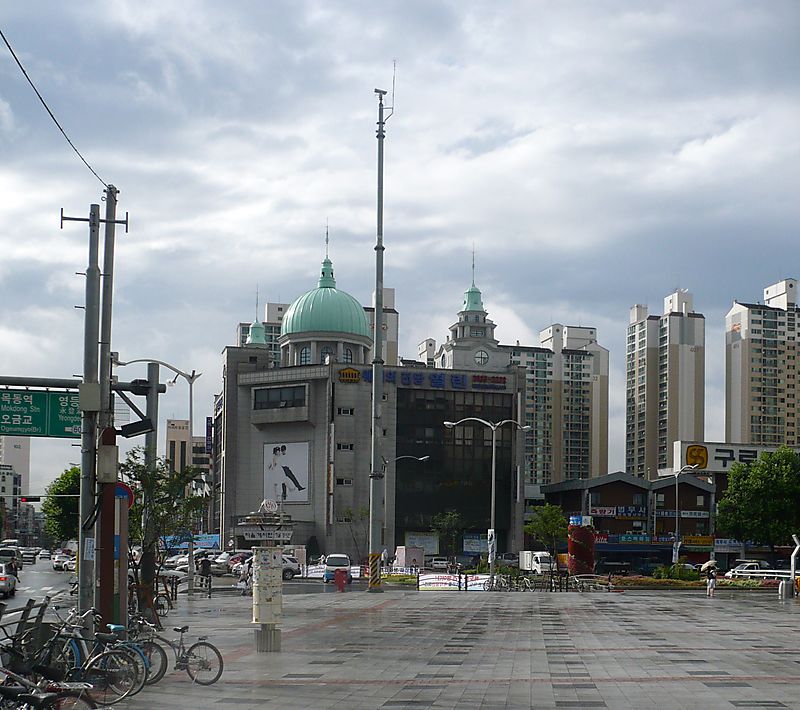
![]()
Caveat: Last Day (again)
Today was my last day as an employee of LinguaForum, and a last day at that location and with the middle-schoolers. I was pretty sad, and feeling a bit cares-to-the-wind about the whole thing, too.
Monday I start at ElBeuRitJi – and I’m feeling a bit overwhelmed by what that will bring. Completely new kids, new curriculum, new environment. And it will be a lot of work – there’s consensus, there. The ElBeuRitJi people take themselves too seriously, and work their people hard. It’s not as relaxed a workspace as I’ve become used to here in Korea. And I’m not convinced I will like it. I’m struggling to keep an open mind about it all.
Here is a picture of my EP2-Tuesday/Thursday ban that I took yesterday.

Attrition in the face of the big changes meant that the last week or so there have only been the three of them. Hannah, Song, and Crazy Paul. Great kids.
I’d love to post pictures of my middle-schoolers, especially my now-to-be-much-missed Princess Mafia (aka TP1 Tuesday/Thursday), but the middle-schoolers are much more camera shy than the elementary kids, and I’m not one to force them to be in a picture for me. But I will miss them very much, and the TP1 Monday girls who were so difficult, sometimes, and those Gag-show boys from PTP/M, and all the rest of them. I’m getting teary…
Here is a picture of me with my erstwhile boss, Curt.
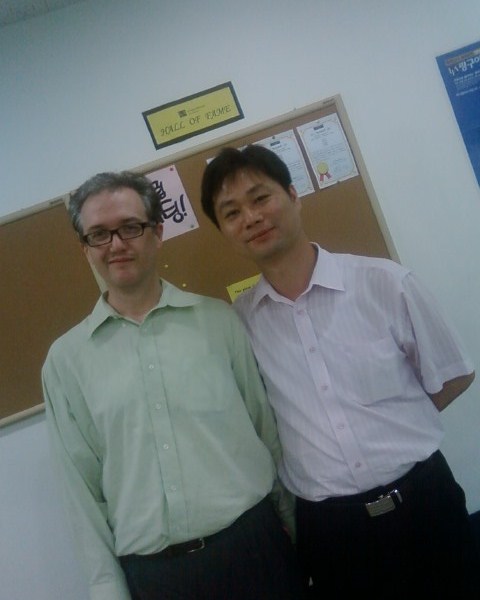
I like Curt – he’s a good guy, and down-to-earth. Note that the picture was tilted because Sylvia wanted to make sure Curt was taller than me – this is a very indirect way of showing deference to the boss. since he’s the boss.
Here is a picture of me with the front-desk-person, Sylvia.

She was always very kind to the students, very genuinely caring and friendly. I will miss her – I could always count on her to comfort a crying child (on those occasional times when I ended up with one in my classroom, due to accident or squabbles or whatever) or to oversee a child parked in the front lobby due to behavioral issues.
![]()
Caveat: Be Yoyr Own Brain
The other day, I saw one of those remarkably bizarre English compositions that occasionally crop up on clothing. There was a man standing on the subway platform at Gasan, down in Seoul. On the back of his shirt was the text, “GENDER BE YOYR OWN BRAIN HYSTERIC VINTAGE MODERN.” I couldn’t resist surreptitiously snapping a photograph of it – it was too unique to ignore. But now I wonder what it means.
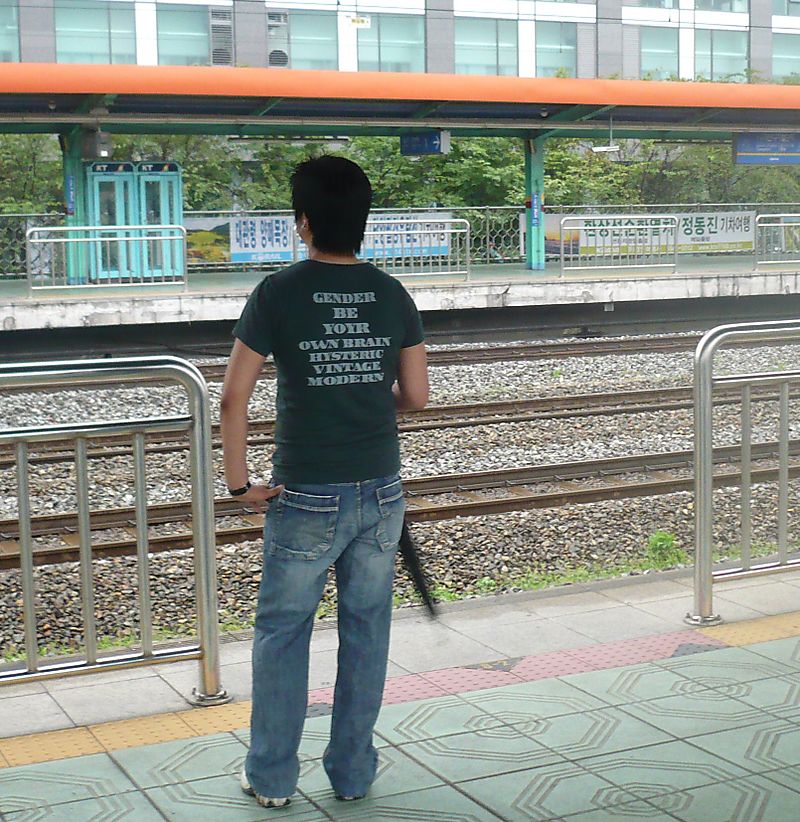
After taking the guy’s picture on the platform, I spun around and took some other pictures from the platform, which overlooked a typically busy Seoul street. The day was rainy and overcast, and the air was thick with humidity. The tires of the cars on the street below made that subtle, sweet, hissing sound that tires make when roads are wet. It’s a sound I find weirdly peace-inducing.
Caveat: 고시
Actually, I have nothing to say, today. I didn’t think about what I might post here, and my mind is currently kinda blank.
Here is a picture I took with my camera phone just outside of the back exit to my building, earlier. I thought the sky looked cool, but it didn’t really come out in the picture. On the other hand, the building across the way, with all its advertising, looks very colorful.
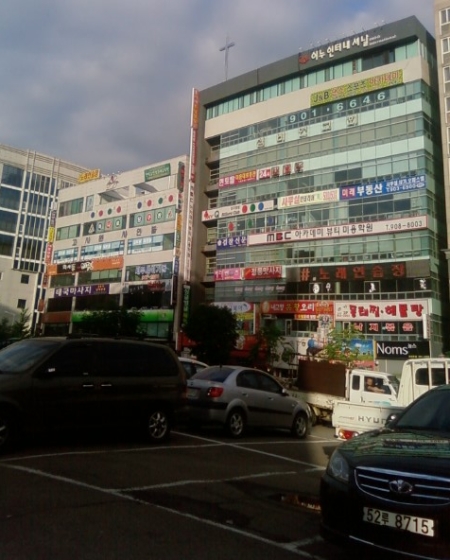
![]()
Caveat: Parlez Hançais?
Konglish (Koreanized English, sometimes also called Engrish, though that term also includes Japanized English, and I don’t really like that term) permeates Korean popular culture, especially in the spheres of marketing. Konglish exists at several different levels, from more-or-less correct English messages attached to advertising, to random English words or pseudo-English words plastered on t-shirts, to “hangeulized” English in the form of minimally adapted loanwords into Korean, and especially used as product names and brand names.
Many examples of “hangeulized” English (i.e. English written using the Korean writing system, and adapted therefore to Korean phonology) can be found on the shelves of the grocery store. Here is an example:
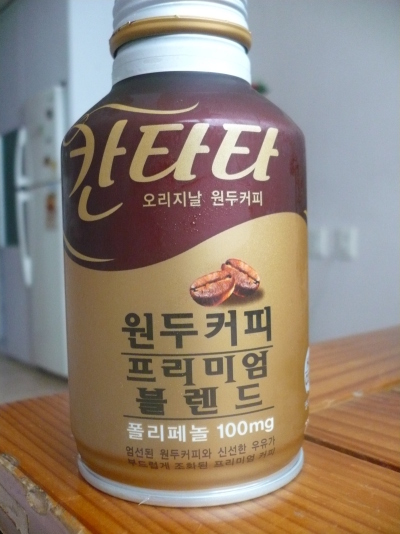
This is a brand of iced coffee that I buy. The cursive-looking hangeul at the top spells out “Kantata” (i.e. Cantata, as in a piece of music), then right under that in smaller letters it says “orijineol wondu keopi” (original wondu coffee). The phrase “wondu keopi” repeats under the coffee beans picture, and then it says “peurimieom beullendeu pollipenol 100 mg” (premium blend polyphenol 100mg). See how that works?
Ok, actually what I want to write about is what appears to be an emerging related phenomenon, which is the use of “hangeulized” French, also in marketing. The advantages seem to be a) French has a novelty factor, while English is rather worn out, b) French has the same high-social-status element that English does, but with less historical and geopolitical baggage (at least here in Korea – don’t try this in e.g. Vietnam).
What’s really interesting, to me, is the subtle way that the French phonological system, as represented using the Latin alphabet, is hangeulized differently for a given etymon than would be done for an identical word in English. Here is a bakery that just opened a few blocks west of here (and note the use of perfectly acceptable English in the supporting text to the brand-name):

The sign’s hangeul reads “bon geurang bageteu” (which is bon grand baguette in French – bad French, actually, since it messes up the gender agreement between the adjectives and the noun, I think). The word “grand” is common enough in both French and English, and if it were an English word being hangeulized, they’d do something more along the lines of “geuraendeu,” but, because it’s French, they capture the different quality of the french vowel, along with the nasalized ending, by doing it as “geurang.”
I’m sure very few people find this as fascinating as I do. I can’t make excuses for my stupid interests. But I’ve decided this hangeulized French needs a name, along the lines of the term Konglish. And I think “Hançais” is just perfect – “han” meaning Korean (in Korean), and -çais for the French part, of course.
![]()
Caveat: 응!
I’m reaching a kind of landmark with my time in Korea.
Cumulatively, I have now spent more time living in Korea than I did in Mexico. And I wonder at the fact that my Korean is still so bad. Well, not really – there are clearly reasons my Spanish improved so fast when I lived in Mexico, that haven’t applied in this situation. I was much more immersed when I was in Mexico.
That year I spent here in Korea while I was in the Army was the opposite of immersion – my exposure to the language was minimal and my opportunities to study it virtually non-existent. And since I’ve been here this time, my work environment does not provide me with the opportunities I had when in Mexico. Then there’s the issue of the fact that a 20 year old brain is going to perhaps acquire language more efficiently than a 40 year old brain.
Yesterday I was learning the words 법 (beop) and 법률 (beomryul), both of which mean “law” in slightly different ways (one is a derivative of the other, and they relate semantically a little bit like the law/legal pair in English, I think).
But it wasn’t the meanings that threw me, but rather the fact that I still haven’t wrapped my mind around the allophonic (pronunciation) rule that says that in a syllable ending in -/p/ followed by a syllable beginning in /r/-, the -/p/ changes to a -/m/. I understand it phonologically – it follows well-documented, similar patterns found in many languages. It’s just hard to remember to do it. And if I forget to do it, the Korean listening to my speaking ends up hearing gobbledygook.
I did sort of work out a cute little aphorism for describing some essential, stereotypical difference between English and Korean pronunciation. As many know, in English, our “default” sound is a kind of very relaxed schwa sound that leaves the lips relaxed and slightly rounded – that “gaping uh” sound. Further, English has a lot of semivowels (like /r/ or “dark” /l/) that purse the lips out a little bit, as in a /w/ (which purses the lips a lot). Korean, meanwhile, seems to have as its “default” sound a kind of high, tense, unrounded vowel (hangeul 으, romanized as “eu” but /ɯ/ in IPA), and many consonants and vowels are much less rounded than in English, with the sides of the lips drawn back almost tightly. When trying to get Koreans to better pronounce sounds such as /r/ or /w/ in English, I’m constantly saying something like, “push your lips out.” And when they’re trying to help me better pronounce one of those difficult vowels, they’re saying something like, “pull your lips back tight.” Hence my aphorism: Korean is a smiling language, English is a kissing language. Hopefully you can visualize this.
Last summer I visited Arcata (my birthplace and hometown) and went out to Mad River Beach. This is a picture I took of a small stone and a sand dollar I saw lying in the sand in the sun in the surf.
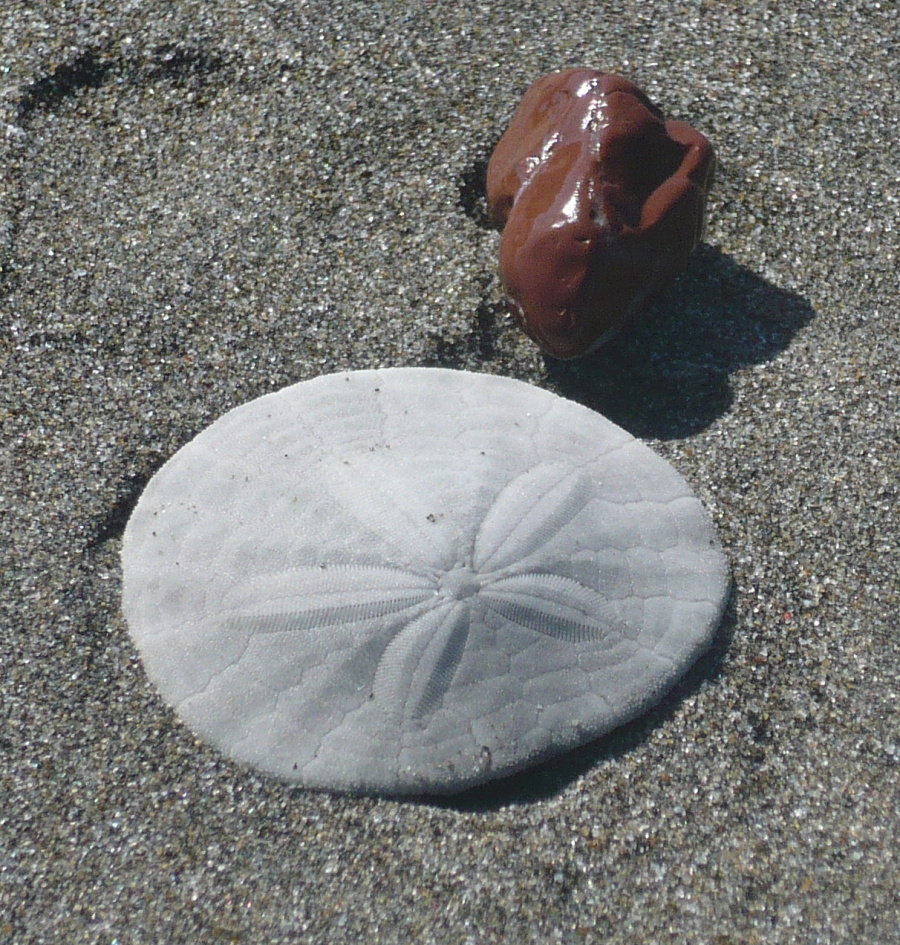
![]()
Caveat: Monks About
I recently came to the realization there must be a Buddhist temple in my building. Sometimes I hear chanting-like noises, and at first I thought it was a neighbor’s television – but it really didn’t sound like a normal television program. And then I saw a sign near the back entrance to my building, and that sort of confirmed it – the swastika is the standard Korean symbol for “Buddhist establishment” used on signages and maps. Here is a picture of the back entrance to my building.

![]()
Caveat: Humilific Fun
“Humilific” is a real word – it describes a class of Korean words (mostly verb infixes and pronouns) that are used to show deference on the part of a speaker with respect to a listener. They are somewhat the inversion of an honorific, which are linguistically more common, and which exalt the listener’s position with respect to the speaker. A good example of a beginner’s level humilific is the use of 저(jeo) instead of 나(na) to mean “I” (first person singular). When I call a student’s house, and I get a parent who I can’t expect to speak English, I have a phrase of badly pronounced Korean where I say “I am the English teacher” and I use this humilific form for the “I” in this sentence: “저는…” (jeo-neun …).
Here is a picture of a building I saw in Suwon, on top of the hill I climbed there last month when I went there, just for kicks and to provide something interesting to look at.
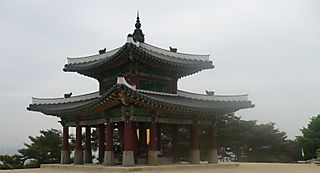
And for those who feel that the price of gas in the U.S. is out of control, consider this:
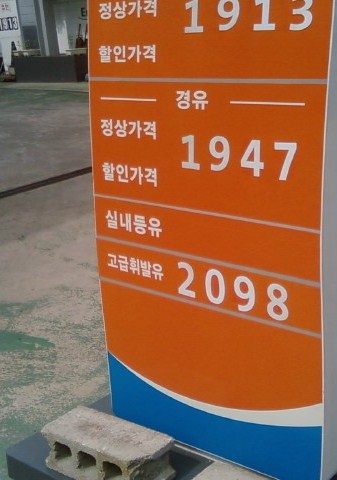 That’s 1913 Korean won per liter, which comes out to about $7.25 a gallon at recent exchange rates. The fact is, American gasoline is highly subsidized, if only indirectly – not least by that astronomical Iraq war cost, but also by military aid to e.g. Saudi Arabia.
That’s 1913 Korean won per liter, which comes out to about $7.25 a gallon at recent exchange rates. The fact is, American gasoline is highly subsidized, if only indirectly – not least by that astronomical Iraq war cost, but also by military aid to e.g. Saudi Arabia.
![]()
Caveat: 도스타코스 (K-Mex?)
I went into Seoul and shopped at my favorite bookstore – Kyobo, just north of Gangnam station (on the Green Line) in the massive Kyobo Tower, along Seochoro. I bought some manga books, a Korean language grammar, and a novela by García Márquez entitled La hojarasca – yes they have Spanish language books at Kyobo, although the selection is only about a single shelf’s worth.
So… I was walking southward back toward the subway station, feeling pleased with my purchases, and lo! there was a taco and burrito joint. Really. In Seoul. I took a picture of the sign:
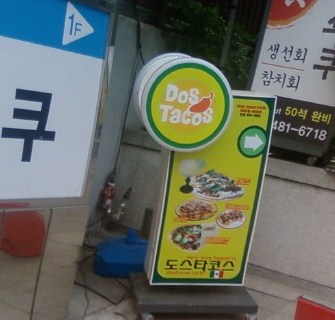
The place is called “Dos Tacos” (in Hangeul, 도스타코스 = doseutakoseu). I went in and had a delicious veggie burrito. It’s definitely Americanized-style Mexican food, passed through a slight but perceptible Korean filter, but it was a nice change. I wonder if there’s a future in K-Mex cuisine?
I’ve noticed that my blog host seems to be inserting my picture uploads differently than before – it appears to be placing them inline rather than making thumbnails and linking them out. I wonder if I like this better. I’ll have to think about it, and try some things out.
Earlier, I had been wandering, a bit randomly as is my occasional wont, and I saw some flowers growing through a fence near a railroad right-of-way, also in the Gangnam area. Here is a picture:
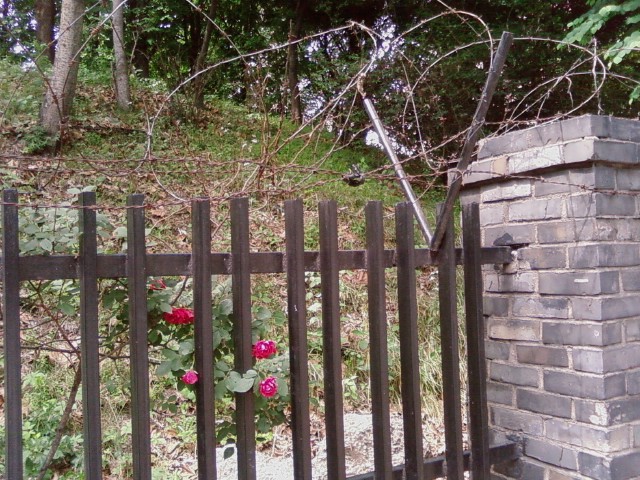
![]()
Caveat: Orange Moon Over Ilsan
I was walking home and saw a very vivid orange moon. I took this picture but it didn’t come out very well. The moon was very bright and very orange.
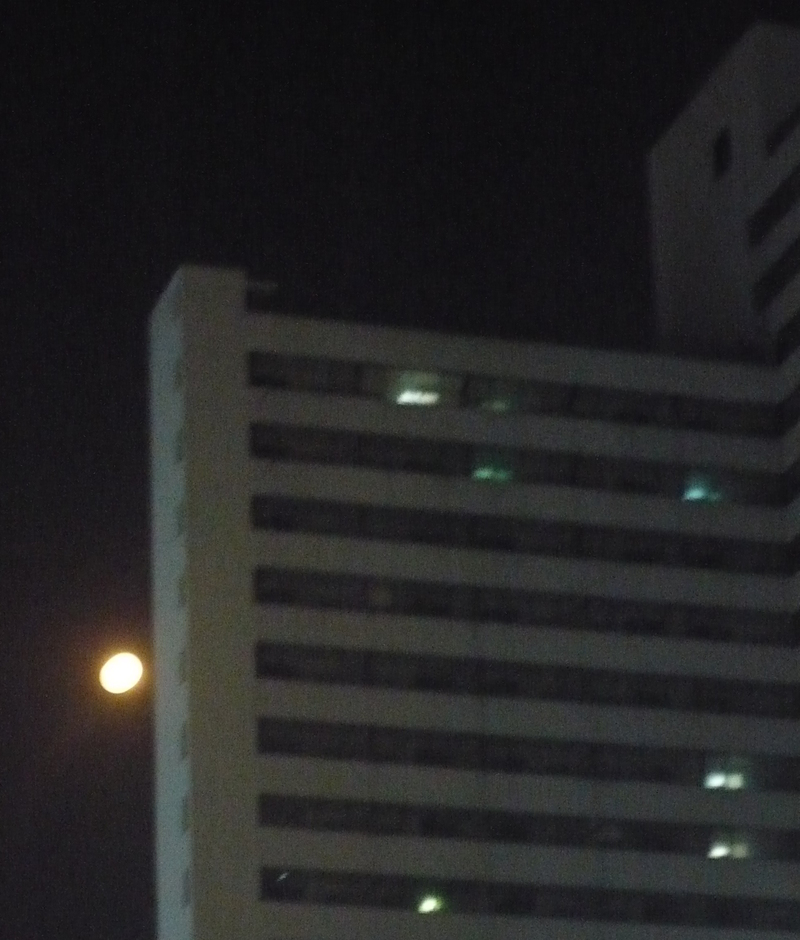
I had a class today where none of them did the homework. This is normally a very devastating and difficult issue… but somehow, their refusal to work is of a different quality from previous experiences of this problem, as I actually enjoy these kids in class a lot, they can be funny, and are often engaged and interested during class. They’re just unmotivated with respect to homework, I guess.
So, today, I got a clue that there might be some “reverse-status” peer pressure, too – i.e. pressure to do badly. This is common with teenagers in the States, but not something I’ve seen much of here. The reason I think this may be occurring with this group is because it turned out, well into the class, that one of the students had, in fact, done her homework, but had apparently been embarrassed to show it to me. I saw she was copying an in-class exercise from a paper that suspiciously looked like the homework, and I got down in front of her and pulled the paper out, and she actually pulled back, before letting me see it. Lo and behold, it was the homework, and it was actually very well done! So all of her peers had zeros, and I gave Eunjeong a 100%. And she seemed sincerely unhappy with this. Very… odd. Kinda sad.
Here is a picture of an oldish building (or rather, design-to-look-oldish) I saw in Seoul recently, coming down a steep hill on side street, south of the river.
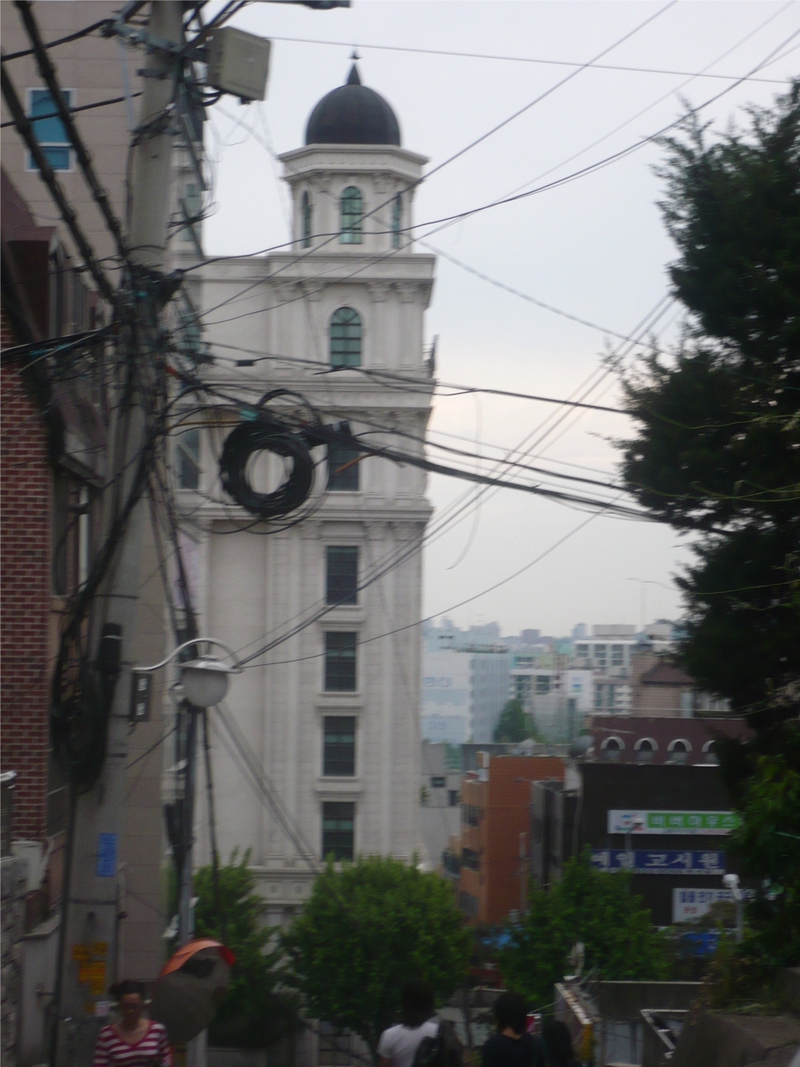
![]()
Caveat: Blossomdrifts
I was walking to work and saw a large “drift” of pink tree blossoms on the sidewalk. Here is a picture.
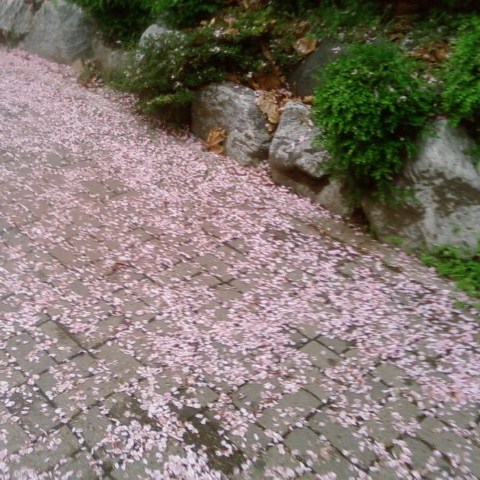
“If you want to have a clear conscience, reflect on the good feeling you have toward your fellow man, but for heaven’s sake don’t do anything about those feelings. Don’t get involved because once you do you’ll be faced with conflict and decisions and the continued possibility of making mistakes.” – Robert Trebor.
![]()
Caveat: Flowers in a Largely Urban Setting
I went exploring today, and attempted some shopping. And I took some photos.
First, I walked eastward from my apartment all the way to Baekseok station (two subway stops eastward from my own “home” station of Jeongbalsan). I took some pictures along the way.
Some public art near the Jeongbal hill.
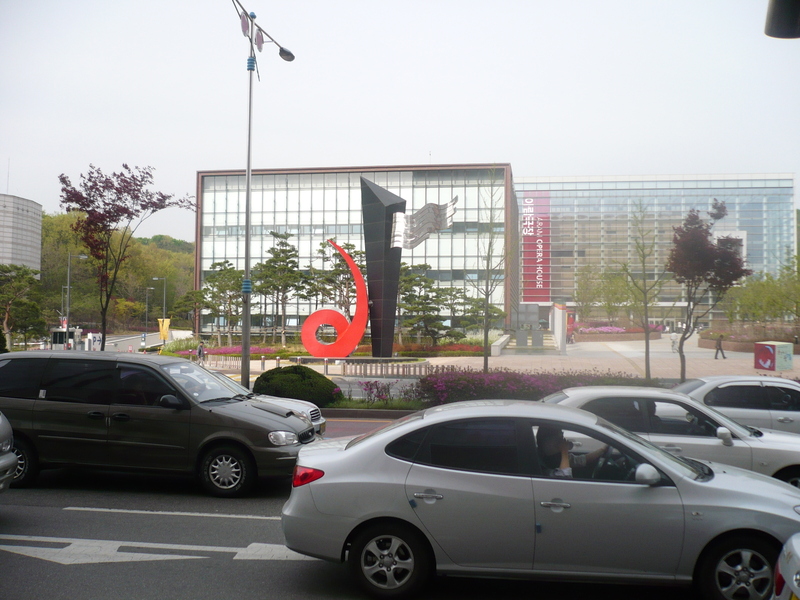
The Ilsandong district office (or “borough hall” – a government building).
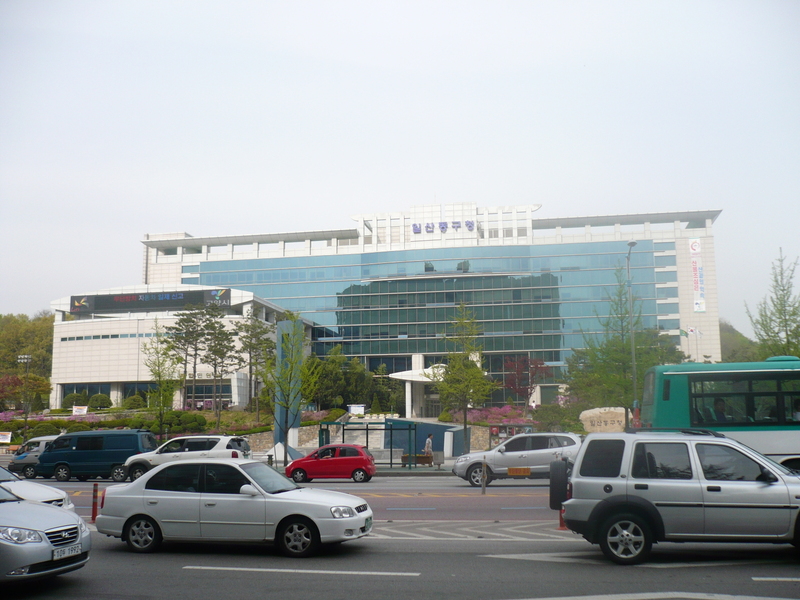
Spring plants and advertising.
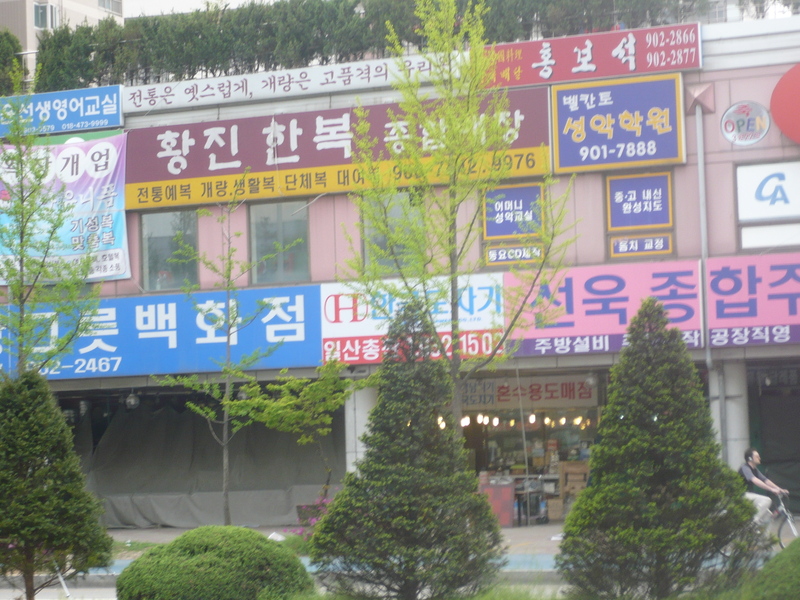
Near Madu station.
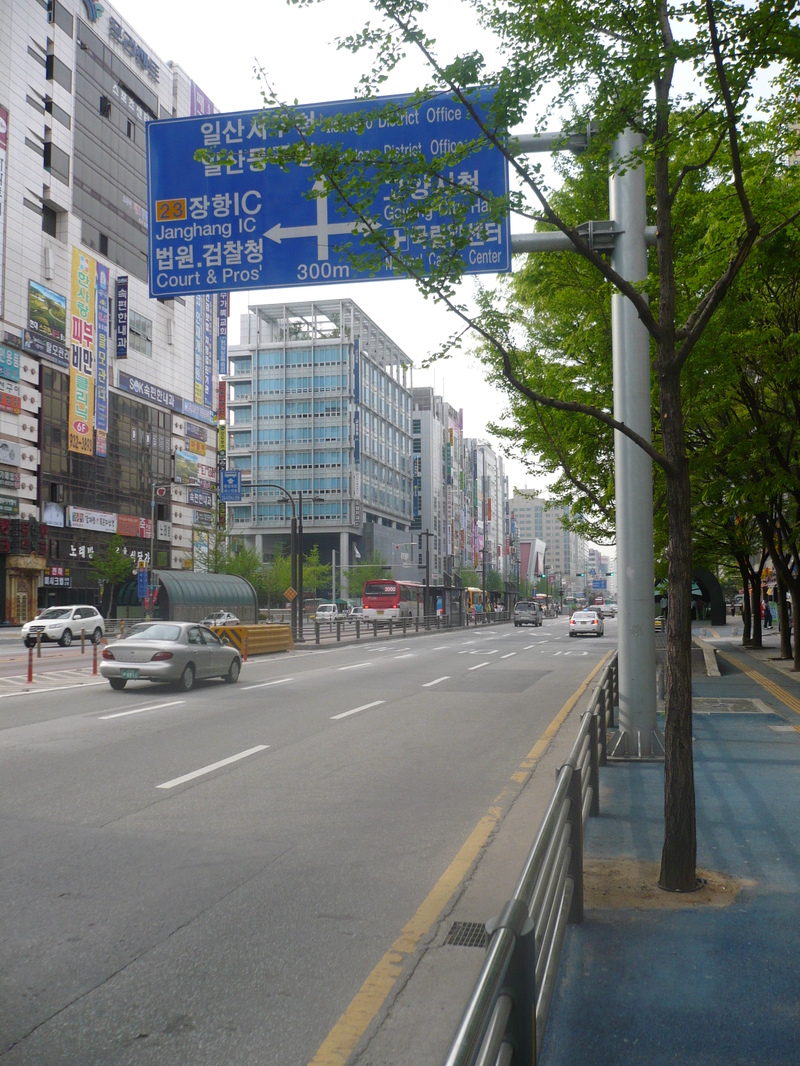
The entrance to Baekseok.
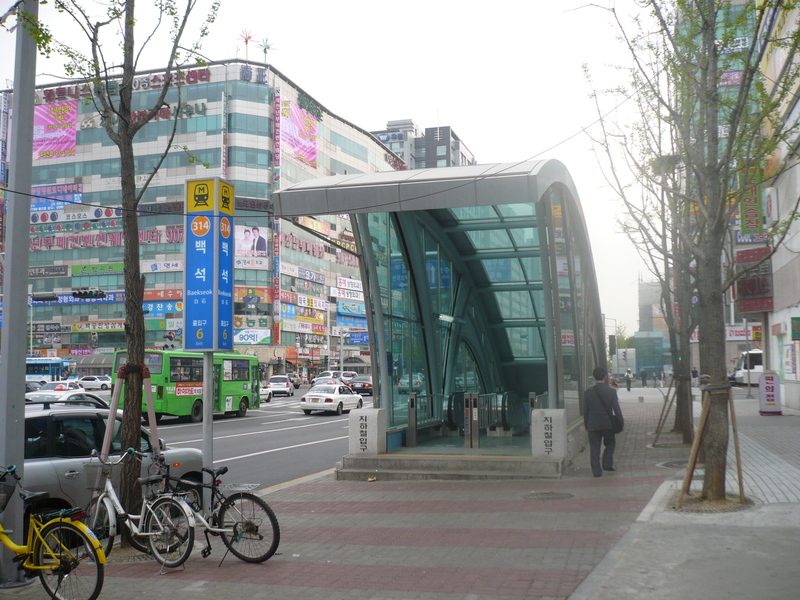
I went to the Yongsan electronics market, but I didn’t buy anything. Just kind of browsed around. I walked to Samgakji. This is the entrance to that subway station, taken near dusk. Note the faint view of the landmark Namsan tower (iconic of central Seoul) in the background.
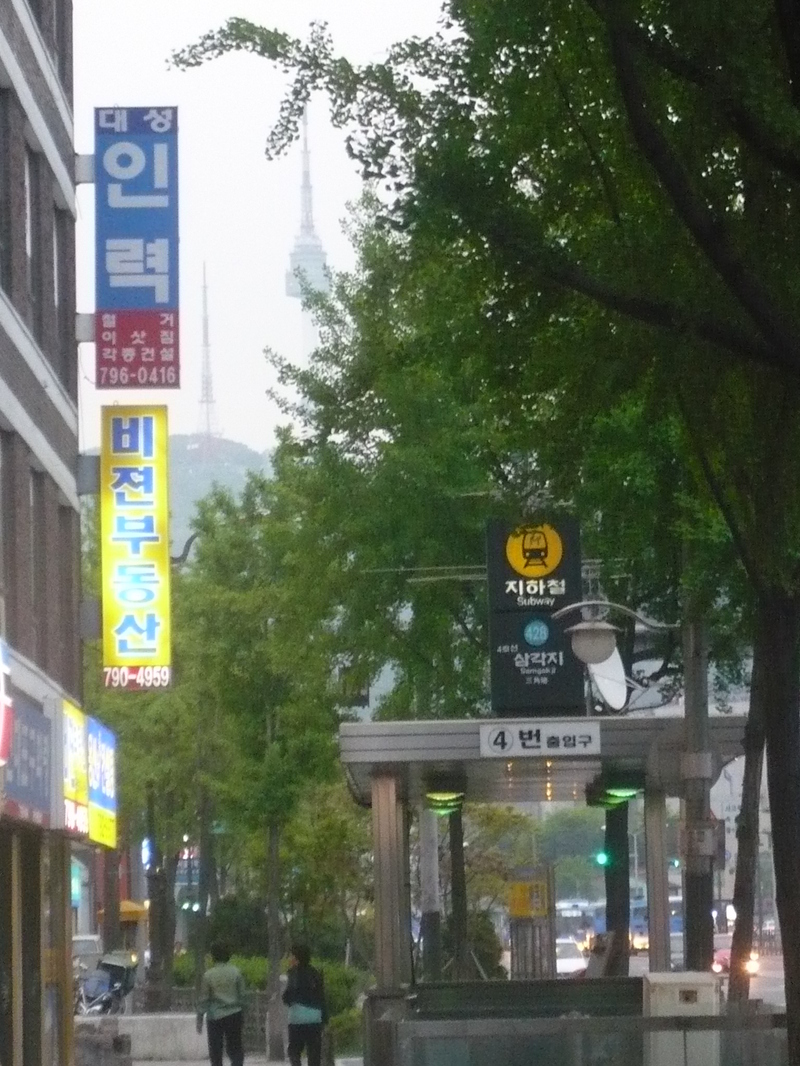
Inside the Samgakji station I watched TV – yes they have large TVs on the walls of the subway stations, and these play banal advertisements and sometimes funny cartoon thingies, in continuous loops.
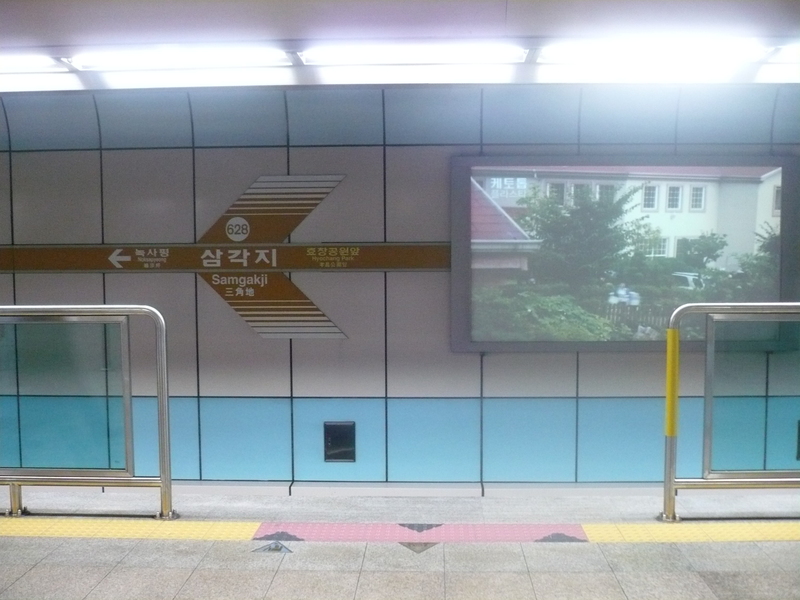
Then I went to Itaewon to that English-language bookstore there (at the top of a hill where you have to walk past a gamut Russian discotecs, African street vendors, south Asian food stores, and Korean women selling… stuff).
I browsed for a while, and bought some used novels to read. After that I went on to Insadong to buy trinkets to give away as prizes to my students. They like these little colorful handcrafted pens and pencils, with ends in the shape of animals and things like that.
On the way, I decided to record why it is that Line 1 (purplish) is so easy to get lost on.
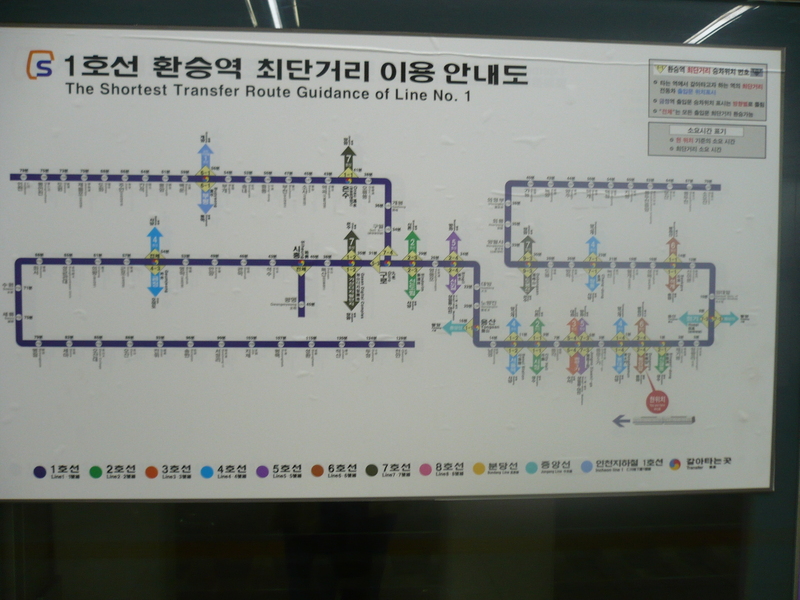
Now I’m listening to Kings of Convenience (an alternative group I guess you might classify them); and Peter Murphy (old emo/goth stuff, always reliably narcotic for my soul). And that not-so-long-ago-released album by the group Spoon, called Ga Ga Ga Ga Ga. I love that name. It’s very late (almost 2 AM). I should go to sleep.
![]()
Caveat: Poesía
Pablo Neruda, en su Poema de Amor #2:
En su llama mortal la luz te envuelve.
Absorta, pálida doliente, así situada
contra las viejas hélices del crepúsculo
que en torno a ti da vueltas.
…
Oh grandiosa y fecunda y magnética esclava
del círculo que en negro y dorado sucede:
erguida, trata y logra una creación tan viva
que sucumben sus flores, y llena es de trsiteza.
Me puse a pensar en estos poemas tan magníficos hoy, mientras caminaba a mi trabajo, mirando los árboles que ofrecían sus flores a la nueva primavera. Hace década y media que me dediqué a memorizar estos poemas, y lo cierto es que ya no los recuerdo. Sin embargo, recuerdo algunos fragmentos, y traje conmigo a Corea mi pequeño texto de los poemas que compré en Temuco, Chile (lugar de nacimiento de Pablo Neruda). Entonces cito unas líneas arriba.
Aquí una foto que saqué hoy de los árboles que me trajeron estas memorias:
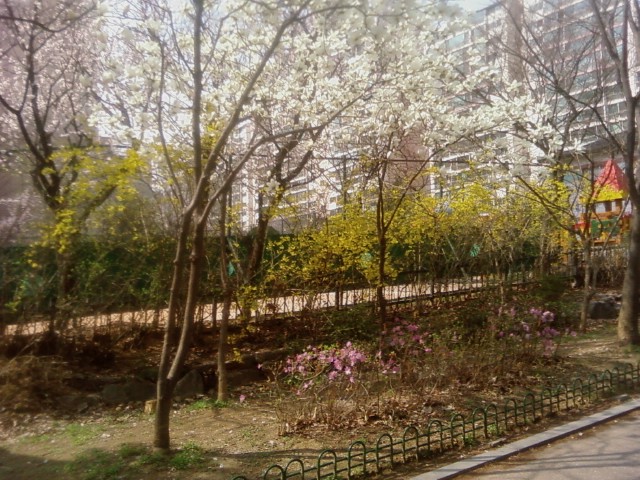
![]()
Caveat: Marriage
I went to my coworker Ryan’s wedding today. Ryan is the youngest teacher I work with (he’s in his early 20’s), but his English is pretty good (he has a bachelor’s degree he earned in Brisbane, Australia), and he’s a very gentle-spirited person – I actually look up to him in a weird sort of way, as an example of how to keep a spirit of equinamity and calmness in the face of the small annoyances and frustrations of work.
So I went to the wedding, partly out of curiosity about what a Korean wedding would be like. Ryan is pretty hardcore Christian, and the syncretism between Korean traditions and evangelical Christianity was interesting. Some things surprised me: it was in no way a solemn feeling ceremony – this was partly because, in contrast to any wedding I’ve attended in the U.S. or Mexico, the audience never really got completely quiet – there was a persistent buzz of chatter, talking, chatting, teenagers checking their cell phones for text messages, etc. And no one seemed bothered by this. I realized this may have implications for my low-grade annoyance with the way kids seem inattentive in my classes, and that it may be something more culturally complex than just teenage disrespect.
Here’s a picture of the two clans, at the end of the ceremony, with Ryan and his bride in the middle, and their mothers in traditional Korean dress, and some others, and a little ring-bearer (?) also in traditional dress.

It was fairly short. Toward the end, a group of four students from our academy did a karaoke of a Korean song, that was very touching. After the ceremony, I saw Danny and Diana, the former owners of the hagwon, and at the reception buffet we chatted a bit about their imminent move to the U.S., where Danny will be getting his doctorate in Christian education (or something like that).
They then drove me back to Jeongbalsan (i.e. my apt) which was a nice opportunity to talk some more about the school – I could tell they were at least somewhat curious about what changes had occurred, and how I was getting on. I’ve always appreciated their genuine kindness, even if sometimes I felt they perhaps weren’t the hugest supporters of me, from a professional standpoint.
![]()
Caveat: The Smart Kids
My students in my ER1T cohort were messing around with their cell phones today, and taking my picture, and I was mugging for them and acting goofy, and decided that turnabout was fair and so we did a class portrait.
Normally I’m reluctant about asking to take pictures of people – I guess it’s a weird sort of expression of my shyness or something, but in the mood of the moment, it seemed like good fun. The result is that for the first time, I will share with my readers a portrait of some of my students.
This is a picture of the ER1T cohort (mostly 5th and 6th graders, ages 12-13 – these are the young ones, but the really SMART young ones, and my absolute favorite class as far as level of fun and motivation).
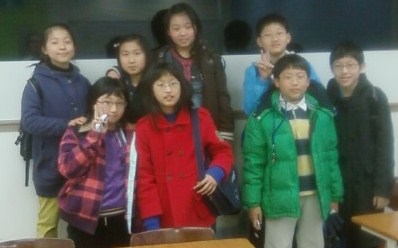
Rear row: Taylor, Gloria, Jane and Harry. Front row: Maria, Ellen, Edward and Will.
![]()
Caveat: Programmable Universe
I finished some books over the last several days. I generally have 4-6 books “in progress” at any given time, and for some reason this weekend and this morning I wrapped up two books in succession: Programming the Universe by Seth Lloyd, and The God Delusion by Richard Dawkins.
Why was yesterday a horrible day? Things happening at work, annoying me. I don’t think I feel like going into it right now, but suffice to say that hearing third-hand complaints (student to parent to “homeroom” teacher to me) about how my favorite class is “boring” kind of has me feeling depressed. I thought things were going well.
I don’t have much to say, I guess, other than that. I’ve been working 10 hour days, Monday and today – grading papers, trying to come up with some way to make classes more challenging and interesting, within the boundaries of the curriculum. And meanwhile, trying memorize my lists of Korean vocabulary.
A few days back I mentioned seeing a “basket selling” truck, and that I snapped a picture of it with my cell phone – but I failed to post picture. So here it is – right on the corner of the major intersection where the school is:
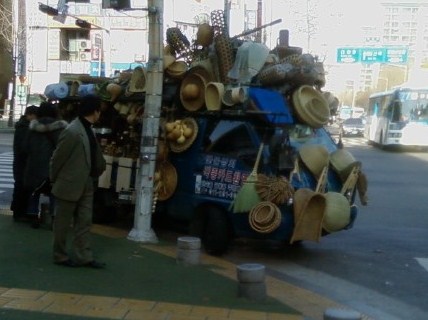
![]()
Caveat: Original of Laura
Vladimir Nabokov, one of the great writers of the recently ended century, left an unfinished manuscript when he died, which is called “The Original of Laura.” He had explicitly requested that it be destroyed, and now, years later, his son (Dmitri Nabokov) can’t decide whether to go through with it or not.
Nabokov, of course, is famous for the novel Lolita. Personally, I like both Pale Fire and Ada much better – especially Ada, with its alternate-universe North America which seems partly inhabited by vaguely frenchified tsarist Russians. I would be fascinated to read a “lost” work of the author’s, but something about respecting a person’s last wishes comes into play too. Dmitri is stuck with a terrible dilemma.
Meanwhile… here is building I saw a while back, a few blocks from here on the other side of the Jeongbalsan (Jeongbal hill).
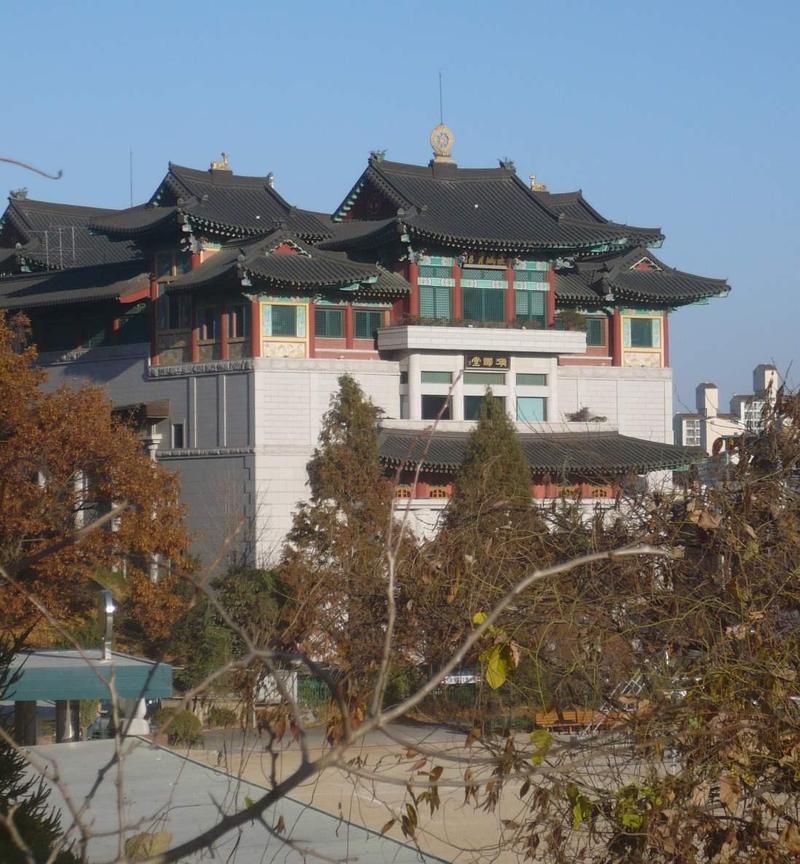
![]()
Caveat: Working
I’m feeling kind of exhausted from work. Number of hours are up; a lot of documentation being required by new employers, which I actually approve of, conceptually, but it’s a lot of work getting used to it.
And I’m engaged in a bureaucratic tangle with my bank over the close/transfer of my stepson’s trust account, now that he’s reached age of “majority.” Argh.
So, meanwhile, here is a picture of the public school (문화초등) that’s half a block from where I work.
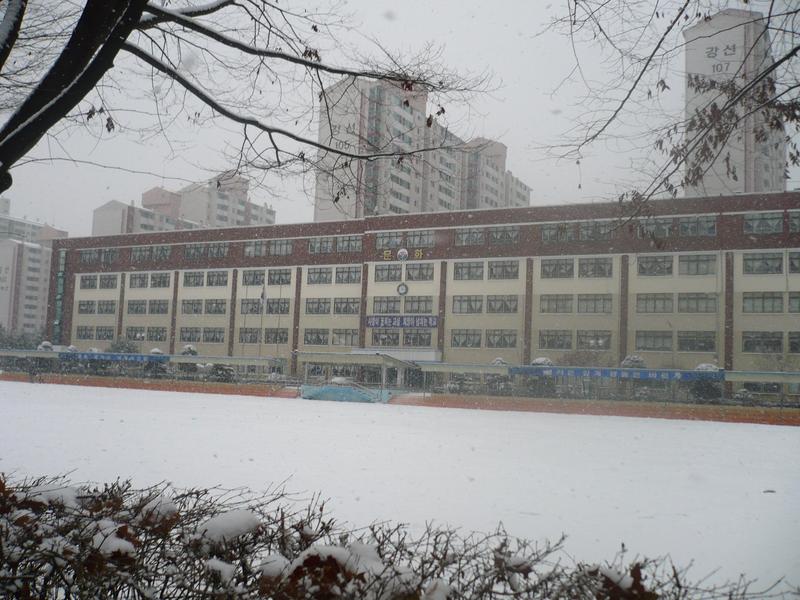
![]()
Caveat: Klingons
Did you know that a group of people are working to translate not only the works of Shakespeare, but also the Bible, into the Klingon language? Is this a great world, or what?
In other news, I definitely despise my web host provider, hostingdude.com. Since coming to Korea, I have not once been able to complete any kind of transaction with the hosting admin website without also having to call them up to get them to accept a credit card number, or unlock a password which has been locked (probably because I’m coming at it from some disreputable “foreign” IP address), or some other problem.
This, despite the fact that I was very careful when trying to choose a provider to find one that allegedly would allow me to work with them exclusively online. So… they suck. But transferring my domains and website away from them while in my current overseas location will likely be very painful and possibly expensive. Which leaves me in that most unpleasant of positions, the helpless consumer. Maybe the people who run hostingdude.com are grumpy, human-hating klingons.
Below is a picture of where I work, with it’s new dark purple LinguaForum Eohagwon sign across the second floor. So those second-floor windows under the purple sign are classrooms where I teach.
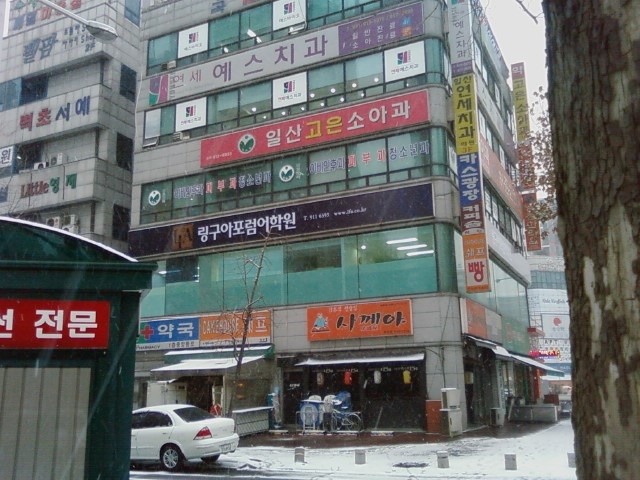
![]()
Caveat: It’s raining helmets… and the Mexican snowplow squadron
I looked up at my television a while ago, which I had on on some Korean channel. I saw a man on a motorcycle, he looked like a zombie. He had a passenger riding behind him. Suddenly it began to rain a large number motorcycle helmets from the sky. The driver of the motorcycle was struck by one of the falling helmets. The television had my attention.
It was apparently the scene from a movie – the show was some movie review show, where they show clips of movies and talk about them, but, since it was in Korean, I didn’t really have much ability to capture what this movie was. But the scenes were pure magic realism, and I was captivated. There was a scene where a woman was reading a white book that fell on her from the sky. And a scene where an immense number of empty plastic bottles and containers (ie. trash) was growing into a giant pile in the center of some huge city. It grew to such large size it towered over the skyline of the city, like a mountain. People went and climbed and had picnics on it, enjoying the view. And could throw their empty containers over their shoulders – so convenient!
So. I had to know what this movie was. Hmm… how to search? Google. I typed in “falling helmets” and “movie”. I found a blog about movies – some woman in Minneapolis, of all places. And lo, there it was: Citizen Dog (Mah nakorn) – a Thai movie from 2004.
That, and yesterday’s snow, has me thinking about a story I started once – my own little foray into magic realism. Like everything I’ve tried to write, it never got finished. The story is set in my familiar haunts in Mexico City. It starts on a morning I actually experienced, when I emerged one chilly morning from the Casa to see it snowing. Of course it quickly changed to rain – it doesn’t really snow in Mexico City – except on the higher elevations surrounding: Desierto de los leones, or Tres Marias.
But then my little story diverges: in the story, it never stops snowing. Partly, I was influenced by headlines of a freak snowstorm in northern Mexico – Durango / Chihuahua / Cd Juarez, which had recently received several feet. I had been obsessing on the concept of hardworking squadrons of Mexican snowplows. I thought ‘the Mexican snowplow squadron’ might be a great name for a rock band.
Back to the story. For forty days and nights it snows. Of course, this means utter social chaos and human tragedy writ large across the hyperinflationary, delamadridista Mexico City of the 1980s. And meanwhile, snowbound in some small non-profit casa de huespedes, the main characters find friendship, love and meaning. Really, I was trying to write this. Once. Several times.
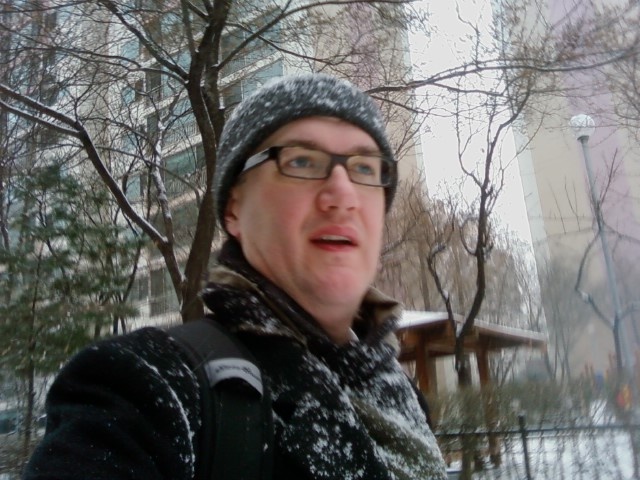
![]()
Caveat: Snow
It really snowed – a long, driving, all-day snow. This is from when I was walking to work, done with my cellphone.
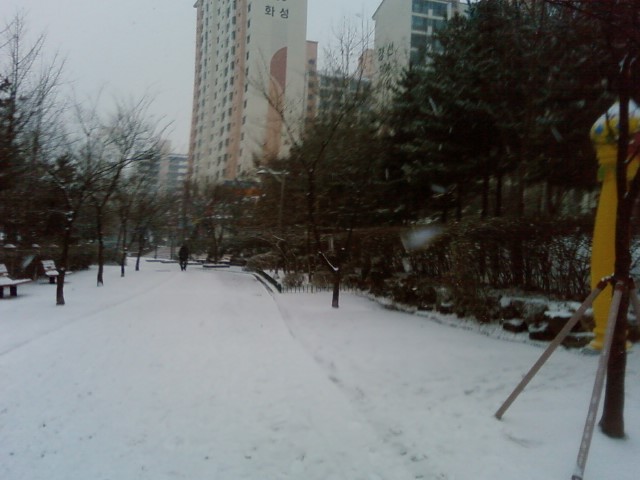
![]()
Caveat: Here and There
I felt I really needed to get out of the apartment.
I took the subway two stops to Baekseok, to look around. I found where the new frequently advertised Costco store is being built. I walked around and enjoyed the late afternoon illumination on the clouds.
I then took the subway two more stops to Hwajeong. I found a few department stores. Walked around some more.
Then I got on the subway and went to Anguk, and strolled around Insadong. I found things to buy, maybe they would be good xmas presents for my nephews, if I can get it together to mail them. Soon.

![]()
Caveat: A Sunday Walk
It was the first day that the high temperature was below freezing, I think, since I’ve been here. And a strong wind from the northwest.
So I thought, today I’ll take my camera and take a walk around my neighborhood. I took almost 100 pictures, and here are some I particularly like. All these pictures were taken within about a kilometer of my apartment, as I walked a roundabout route past the subway, up through the park with the little hill, around past near where the Tomorrow School is. They’re shown in the order I saw them, roughly.
This is a street about 4 blocks east.
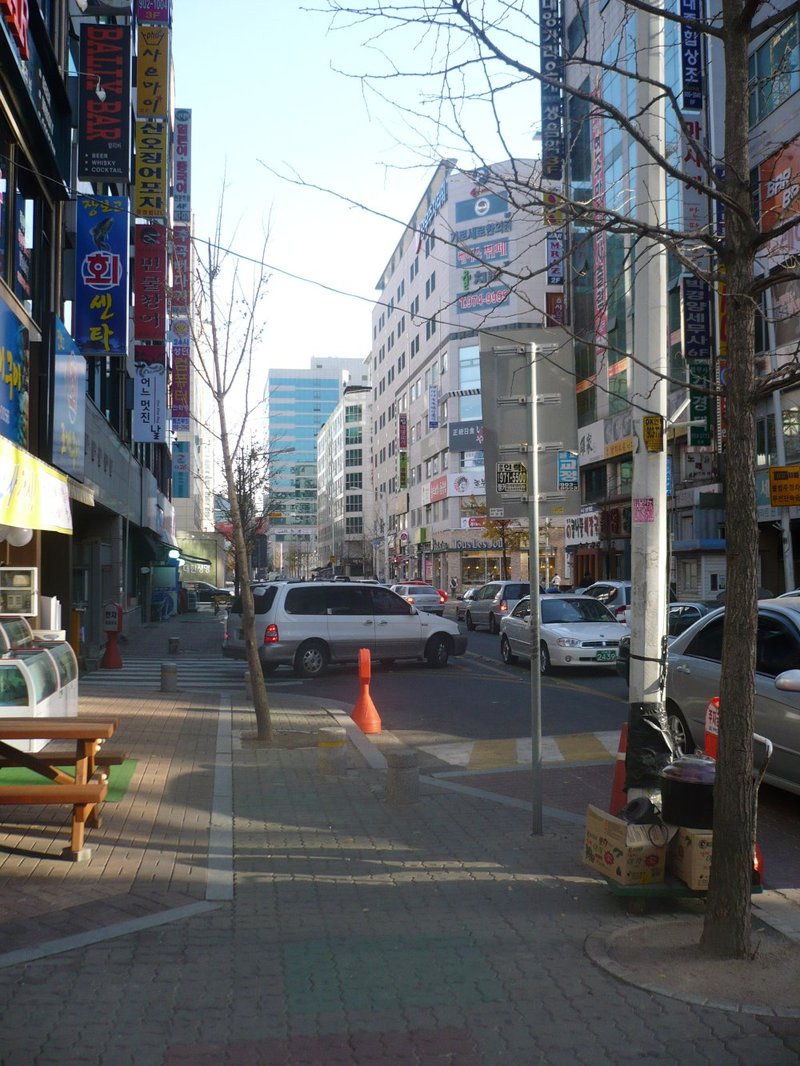
This is the entrance to the Jeongbalsan subway station.
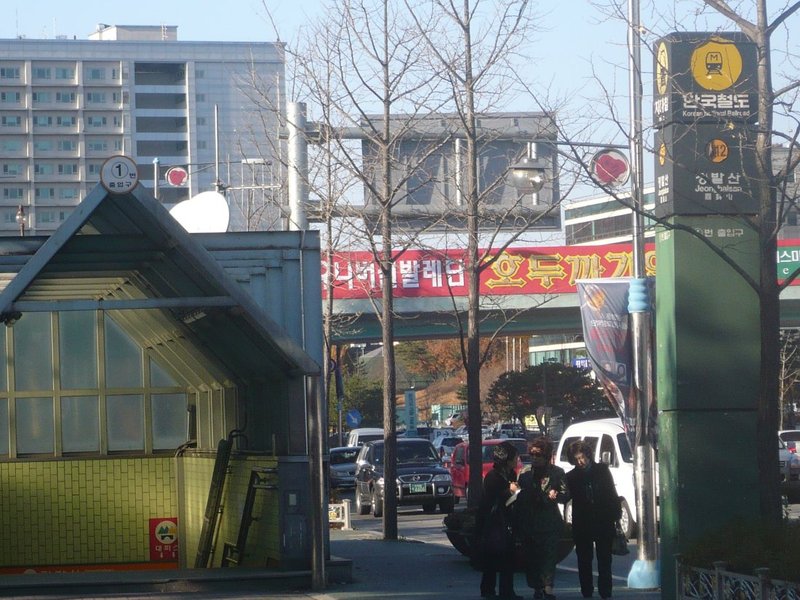
This is a government office near the subway station.
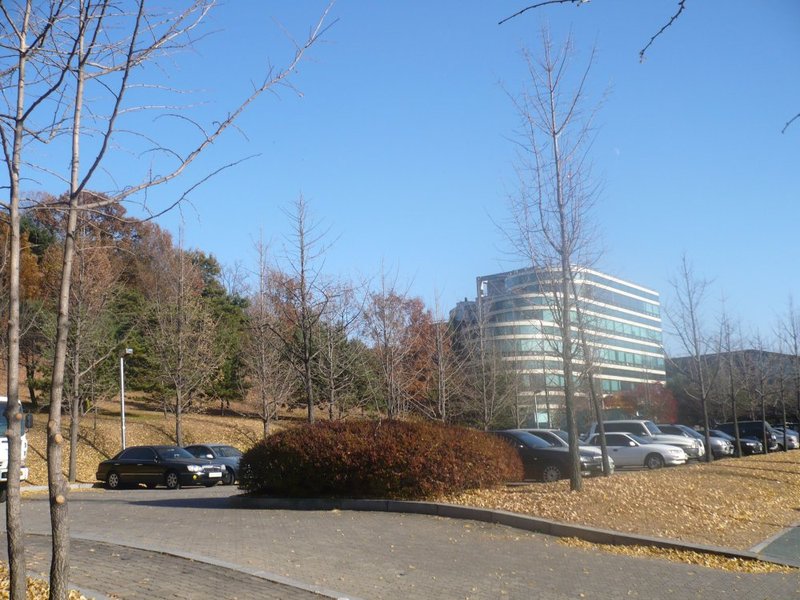
This is the same office from the other side, and a flower on a trellis.
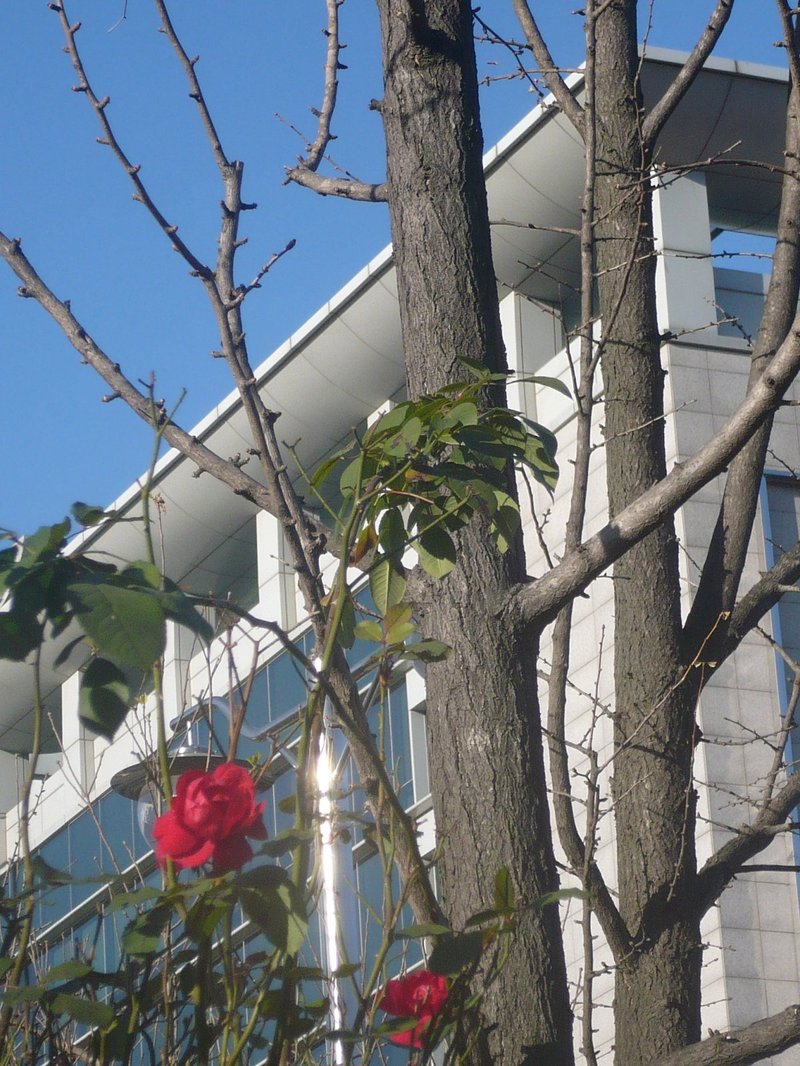
This is a path up the hill.
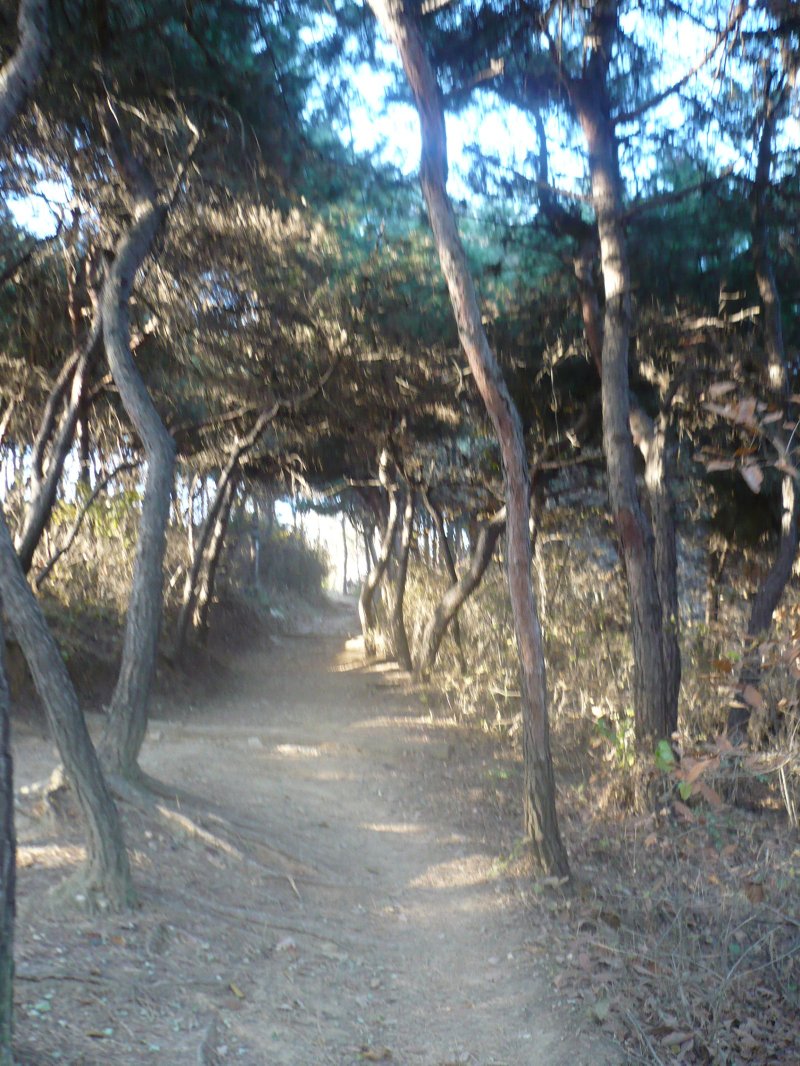
This is a view looking northeast from near the top of the hill.
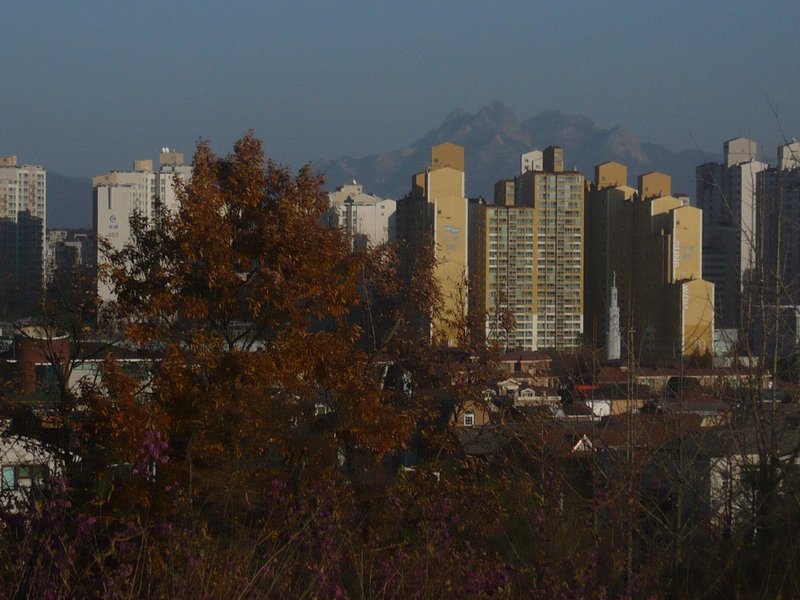
This is a friendly dog I saw in someone’s yard.
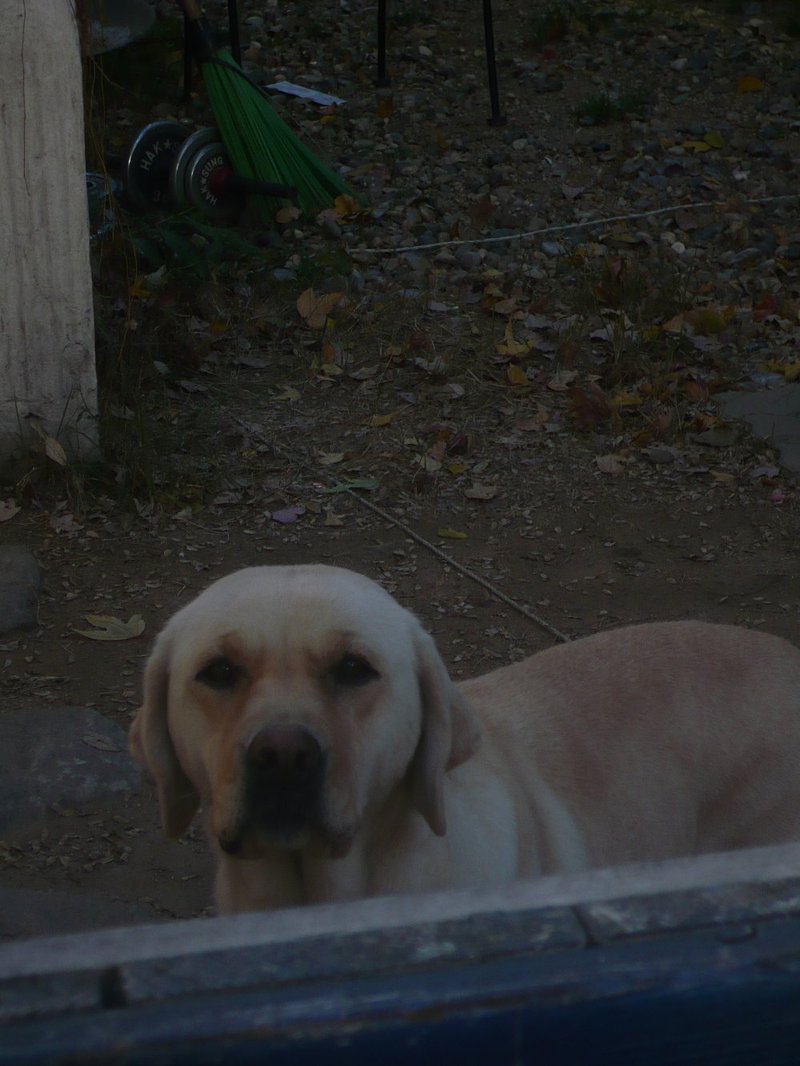
This is a rather posh American-looking house.
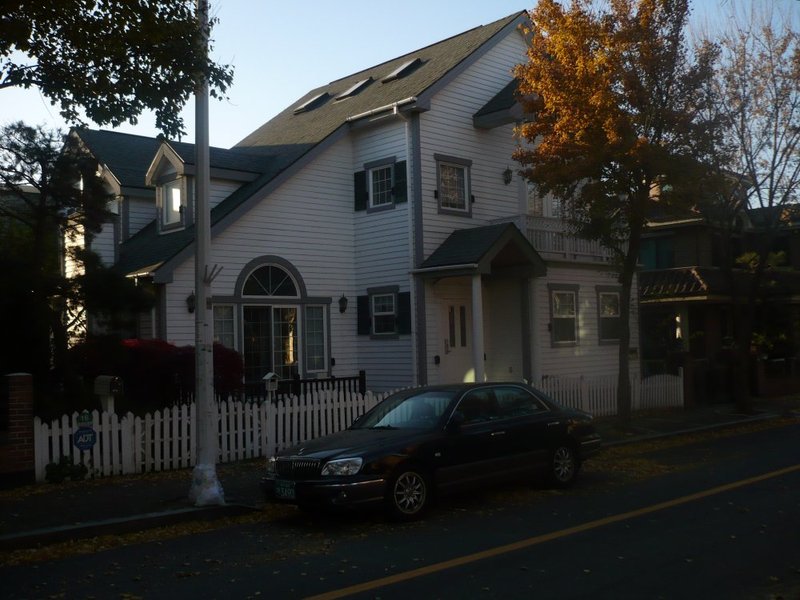
This is a backhoe and a tree.
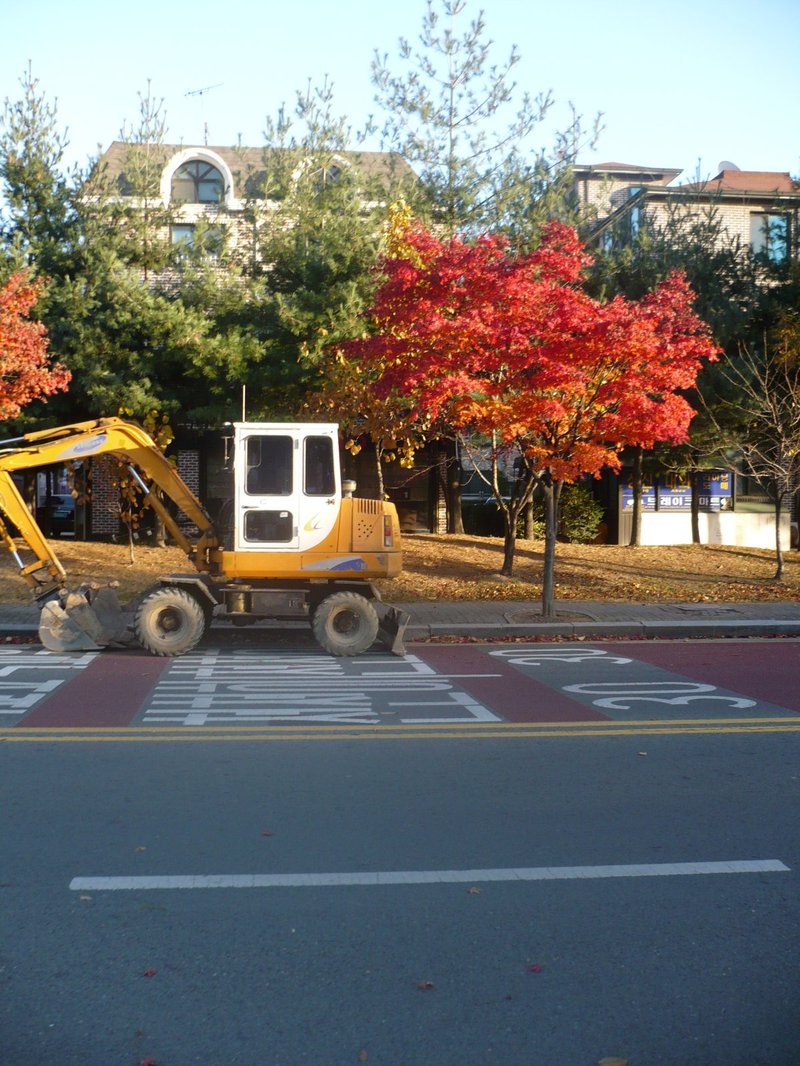
And finally, proof that my students have opportunities to apply their hard-earned English skills out in the real world, right in their neighborhood.
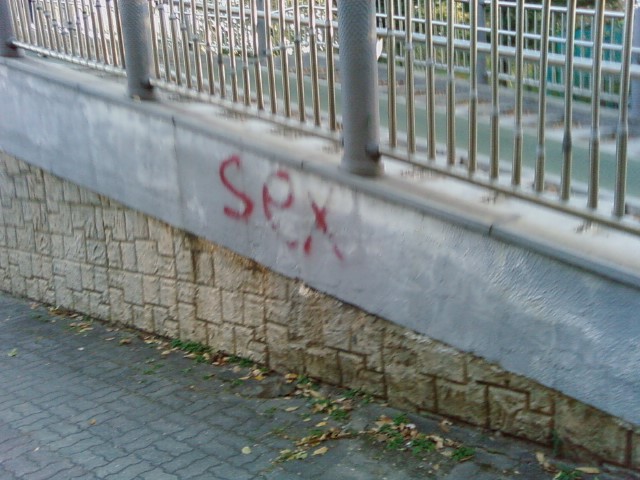
![]()
Caveat: Pale Cement, Aging Peach
I walked to work this afternoon at about 3.30 (Wednesday have the reduced schedule), and it was hazy, about 12 degrees (54 F?). The sun looked like an aging peach resting on a pale cement sky – it was sufficiently overcast that there was no glare to look directly at it, but the disk was a perfect deep orange color, like you see sometimes at sunset. Hmm… is this the Gobi sand sky you get from Mongolia, in the winter? I sort of remember some kind of phenomenon like that.
I took a picture of the path among the apartment buildings with my phone.
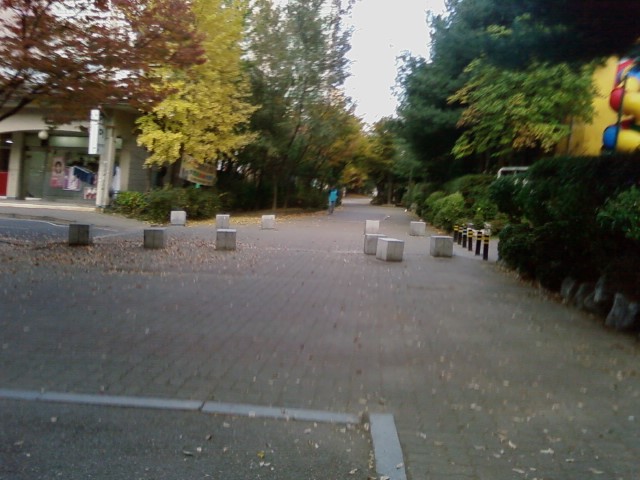
I had awoken this morning dreading my T2’s today. But Danny had given them a good talking to during his class, and when I got them at 8.40, they were moody but gamely putting in a sincere effort. I’d been remonstrated too, by my coworkers.
And so, all of us chastened, we made a go of the excruciatingly boring TEPS book (TEPS is a Korean high-school level English proficiency exam – the students’ motivation levels are not aided by the fact that the exam’s status is in flux currently, as there is much talk of it being replaced across the board by the TOEFL, which would make the test-specific instruction less-than-relevant).
Walking home, I took another picture, showing the view from a pedestrian bridge I use to cross the boulevard I call “broadway” in my mind (this is the still nameless “main drag” in my part of Ilsan City), looking northwest toward Juyeop station, and further along, toward Kim Jong-il’s socialist workers’ paradise, lurking out there in the night like a bad business proposal.
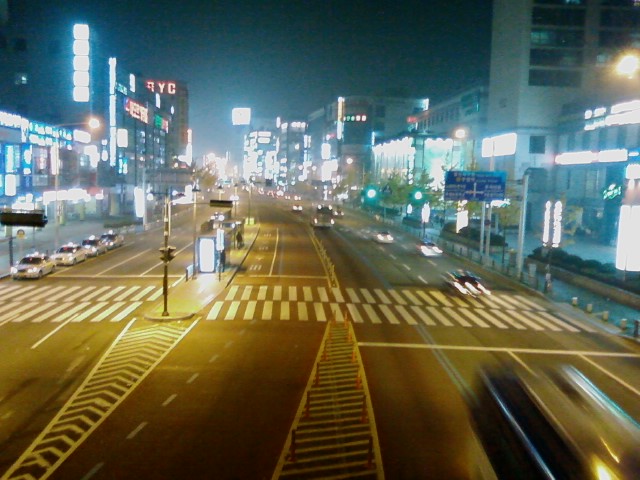
![]()
Caveat: Blogical Purity
So this is my 31st post in a row, on the last day of October. Thus I have achieved a high blogical purity for the month! Boo. (Happy Halloween.)
School’s been a bit chaotic, lately, as yesterday, the 30th, was the day of major exams for a large proportion of the students who are applying to the prestigious residential high schools. I can’t imagine it’s particularly ego-boosting – they were telling me last week that most of the schools end up accepting under 5% of applicants. So any news of positive performance on the exams is celebrated with much nodding and bowing and congratulations.
Anyway… the kids are also, therefore, dead on their feet (if they come at all, which they didn’t, today), and the ones not participating in the exams seem to pick up the exhaustion via a kind of social osmosis. Kind of a strange atmosphere of pent-up frustration and tiredness.

![]()
Caveat: Rurality
Perhaps I was inspired by my previous post. Yesterday afternoon I took the subway to Daegok, and boarded one of the regional commuter rail trains, bound for 임진각역 (Imjingak station). Imjingang is basically the end-of-the-line to the northwest of here, and lies just about 3 kilometers from the DMZ (North Korean border).
I had in mind the idea of actually seeing Camp Edwards – but I couldn't find it. My geographic memory clearly isn't perfect – I had a recollection of it sitting right on the railroad, near the main highway. But two factors intervene: I don't know which railroad it sat on, but I don't think it was the commuter line, as I remember having to take a taxi into central Munsan when I wanted to take the train into Seoul; also, Camp Edwards may not actually exist, now – the US Army has been significantly rearranging its Korean deployment over the last decade, especially moving away from major towns (such as Munsan or Dongducheon).
So I didn't find Camp Edwards. But I walked through territory that was more than a little bit familiar, and covered the distance from Imjingang to downtown Munsan on foot (about 8 kilometers, given my roundabout route). I enjoyed the scenery.
Above is the Imjingang bridge. In typical South Korean fashion, they have placed a major amusement park ("recreation park") here up against the DMZ – sort of this weird institutional tendency to pretend it's not really a major, militarized international border. So right behind me from taking this picture, on the north side of the river, there were zillions of families on Sunday outing, a little amusement-park train going around some veterans memorial statue, a ferris wheel….
The concrete pillars are the old railroad bridge, and I remember these pillars vividly. But just beyond, there is now a new railroad bridge that wasn't there in 91, and there has been much talk in the press of the new workable (but not currently actually working) rail connection with Pyeongyang. Not to mention the talk of eventually hooking South Korea's KTX (high speed rail) with Russia's! That would be cool… you could take the train from Seoul to Moscow!
Looking down, there were lots of men lazily fishing in the Imjingang (i.e. Imjin River)
Walking south, I saw lot's of lovely trees, changing with the fall weather.
Above, these are some scarecrows I saw in a field. I had this weird feeling that I spent a cold April day in this field, or one nearby, fetching a Humvee that some insane G.I. driver had flipped like a turtle into the mushy muddy rice. I worked in "vehicle recovery" here… which is to say, I had a large green tow truck (named – not by me, but appropriately – "Rocinante"), and one of my jobs was to go out and rescue stranded Army vehicles from various spots. This flipped Humvee was one of the most memorable, as it was the only instance where I was personally involved where there had been a major injury – the G.I. who'd flipped his vehicle had a broken back or something. Made me somewhat paranoid about cruising around at too-high speeds in the soft-top Humvees that were so popular then. Not so common now, since they're mostly "hardened," based on experience in Iraq, etc.
These are some flowers I saw.
I saw a man on a tractor, and he waved to me.
Later, as I walked farther south, I saw the man again, working with some others unloading a rice-threshing gadget from a truck. He hailed me, and I discovered he spoke extremely good English – he'd lived and worked 8 years in Dubai, and also in mainland China, more recently, and wanted to talk politics. It was interesting. He was worried about the "red menace" and was extolling the virtues of George Bush's hard line with North Korea. Perhaps typical of his generation in South Korea, I think.
He observed that given how South Korea is a U.S. client, geopolitically, and how the Chinese still viewed North Korea as "theirs," the DMZ was, interestingly, the place where the U.S. and China had a common border. This was fairly sophisticated thinking for a Korean farmer. I wonder how typical it is?
I kept walking…. I passed the 운천역 (Uncheon rail station), and this sign.
As the sun set I got into the outskirts of 문산읍 (literallly Munsan village, though it's clearly outgrown what we would call a village), which appeared much grown from my recollection. Here is a fairly typical sight everywhere in Korea: cranes building high-rise buildings in the middle of nowhere.
Now I'm listening to a streaming Mexican radio station from Estado de México, and thinking about the commonality of rural lifestyles, all over the world.
Caveat: I dreamed I was blogging
Really. I woke up this morning from a dream in which I had been writing all these excellent posts to my blog. Of course, I couldn’t quite make out what the these fabulous posts were about, regrettably. So instead, all I have to post about is the dream.
The weekend was a pretty lazy one, as weekends go. I had this huge ambition to try to go somewhere new, but I didn’t. I did a lot of reading, and although I’m not feeling sick at all anymore, I decided I had been stressing too much about my efforts at teaching, so I resolved to not push myself to do anything I didn’t feel motivated to do, this weekend. The consequence was that although I did quite a bit of walking, it was completely untouristic in nature – I just explored bits of my neighborhood and the larger Ilsan area.
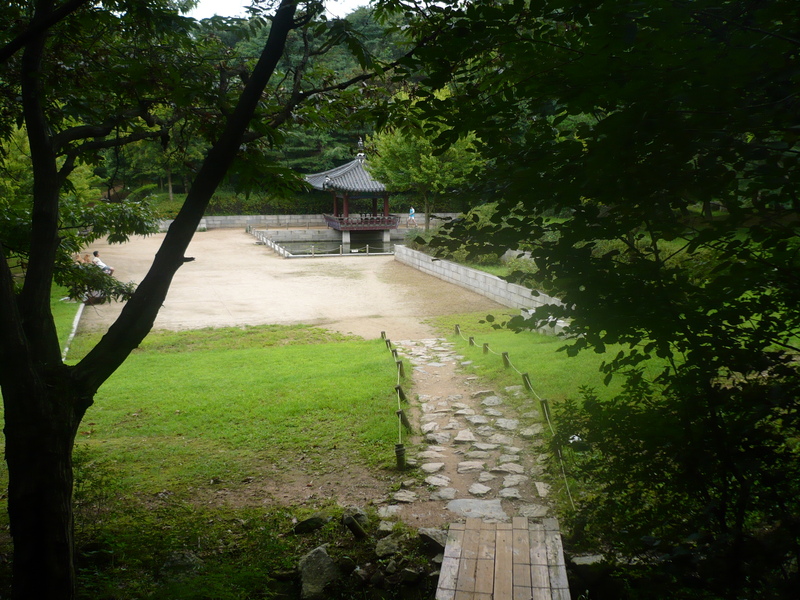
Caveat: Seoul
Not feeling in a writing mood. But I promised to post something everyday. I’m listening to some new music I downloaded – LCD Soundsystem’s “Someone Great” which reminds me a bit of a kind of hyperactive Magnetic Fields song, actually.
Here are a few pictures.
This is Seoul, looking north across the Han river from Yeouido Island toward downtown, Yongsan and Namsan – see the tower, right horizon?

This is the main south gate of the old city – the walls no longer exist, and so it’s just a gate in the middle of a giant traffic circle. It’s called Namdaemun.

This is the infinite stairway in my building, looking down. I often take the stairs, as it’s more exercise that way.

What I’m listening to right now.
[Update: I added this youtube video 2011-08-03 as part of background noise.]


